Special Report
The Most Democratic County in Every State

Published:
Last Updated:

Next month, the United States will finally elect its next president after nearly two years of campaigning, fundraising, scandals, and debates.
The Democratic party has never been perfectly unified. In this year’s Democratic primary, disagreements among registered Democrats seemed especially acute. Approximately 12 million Americans voted for former presidential candidate Bernie Sanders, versus the 15.8 million who voted for nominee Hillary Clinton. Some portion of voters who supported Sanders in the primary will likely either not vote, or cast a ballot for a third-party candidate.
Yet, the country’s two-party political system is so structurally entrenched that the majority of states that went for Democratic candidate Barack Obama in 2012 appear likely to go for Clinton this time as well. While the political platform of a party and the candidates within that party can change over time, it seems that a portion of the population will always vote Republican or Democrat no matter who is running for president.
Click here to see the most Democratic county in every state.
Click here to see the most Republican county in every state.
Based on voting data compiled by political news organization Politico and a review of current and historical representation in the U.S. Congress, 24/7 Wall St. created an index to measure the political leanings of county residents. The index is based on the political party of the county’s elected representatives to the Senate and House of Representatives through the last five election cycles, as well as the results of the 2012 presidential election. Prince George’s County in Maryland is not just the bluest county in the state, but also in the nation.
Even in the most conservative states, there is at least one county that has strong Democratic leanings. In Alabama, 61% of total voters opted for Republican candidate Mitt Romney in the 2012 elections, one of the highest shares the losing the candidate received of any state. Yet, in Greene County, nearly 85% of voters cast ballots for Obama. While the state has had Republican representation in the Senate for years, Greene County’s congresswoman, Terri Sewell of Alabama’s 7th district, is a Democrat. Sewell’s predecessor, Artur Davis, is also a Democrat.
While both those counties lean heavily Democratic and the reddest states each tend to have low incomes, adults in the blue counties tend to have higher educational attainment rates compared to the reddest counties. In 33 states, adults in the most Democratic county had a higher bachelor’s attainment rate than those in the most conservative-leaning state.
Race clearly bears a strong relationship to political affiliation in these counties. In only three of the reddest counties, a lower share of residents identify as white than the national share of 63% of Americans who identify as white. On the other hand, 28 of the bluest counties have smaller shares of white populations compared to the national average composition.
Click here to read our methodology.
These are the most Democratic counties in every state.
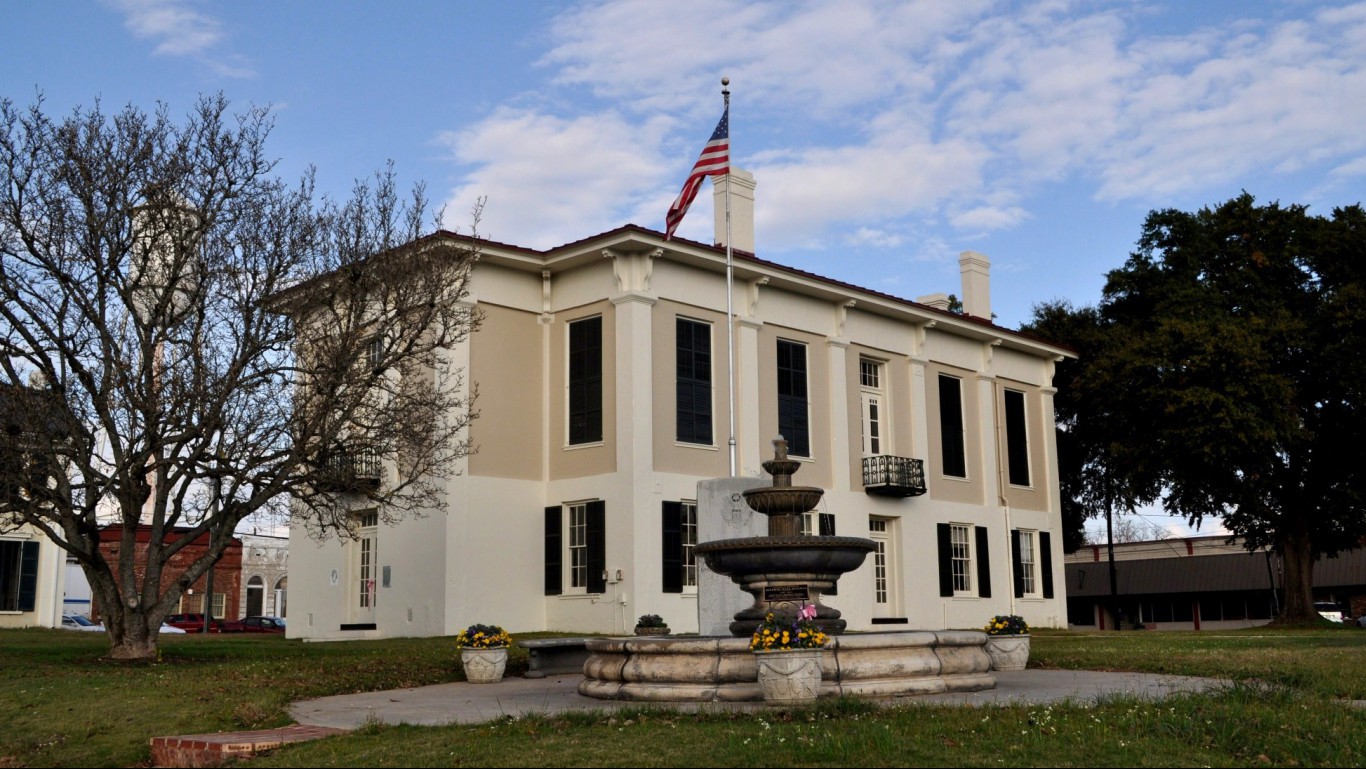
1. Alabama
>Bluest county: Greene County
Obama won 84.7% of votes in Greene County, the highest share of any Alabama county except for Macon. Unlike Macon, voters in Greene County helped send a Democrat to the U.S. House of Representatives in each of the last five congressional elections. As is generally the case in predominantly Democratic areas, the county’s median household income of $22,170 is lower than the national median of $52,482. Additionally, more than 30.0% of Greene County residents lived in poverty compared to 15.6% of Americans.
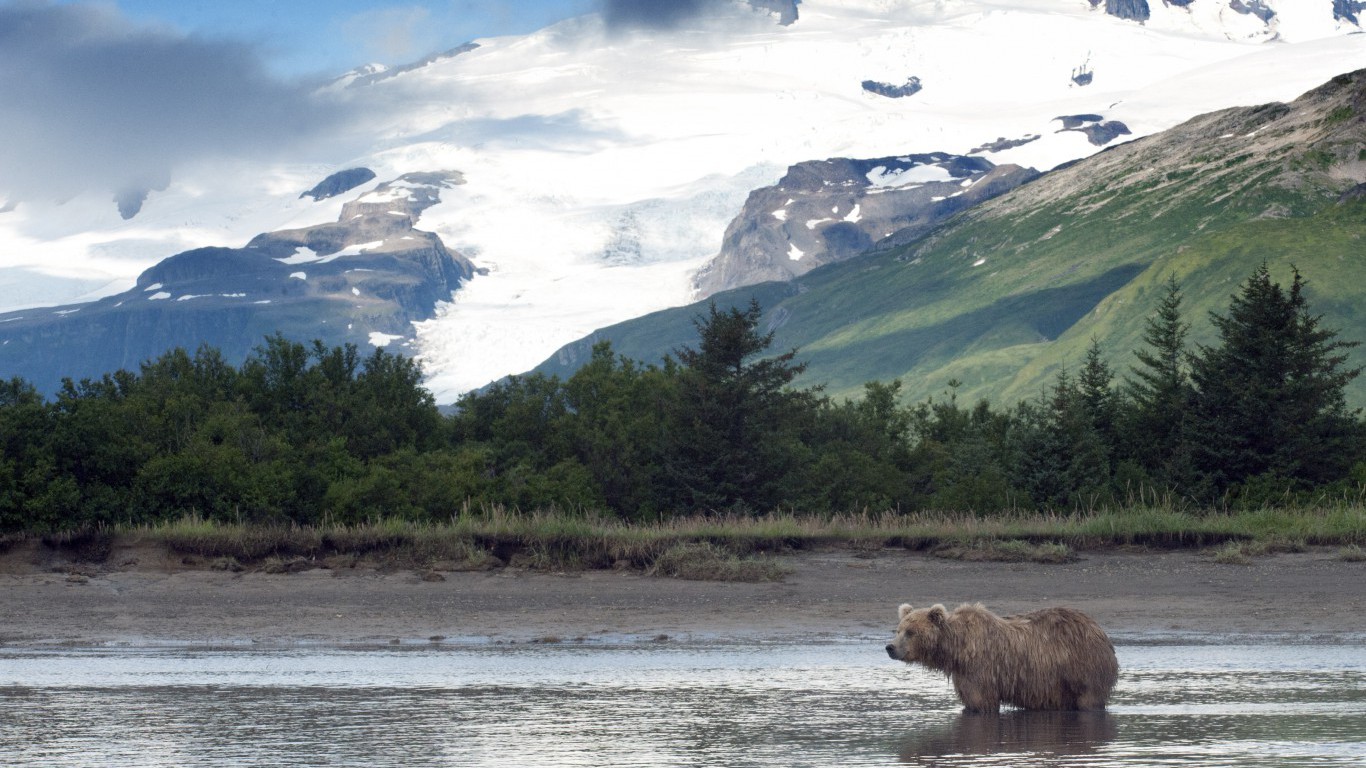
2. Alaska
>Bluest county: N/A
Data for Alaska counties is not sufficient to identify the most or least Democratic area in the state. However, Alaska residents as a whole trend conservative. A majority of eligible residents in the state voted for Romney in 2012, and all three members of Alaska’s congressional delegation are Republican.
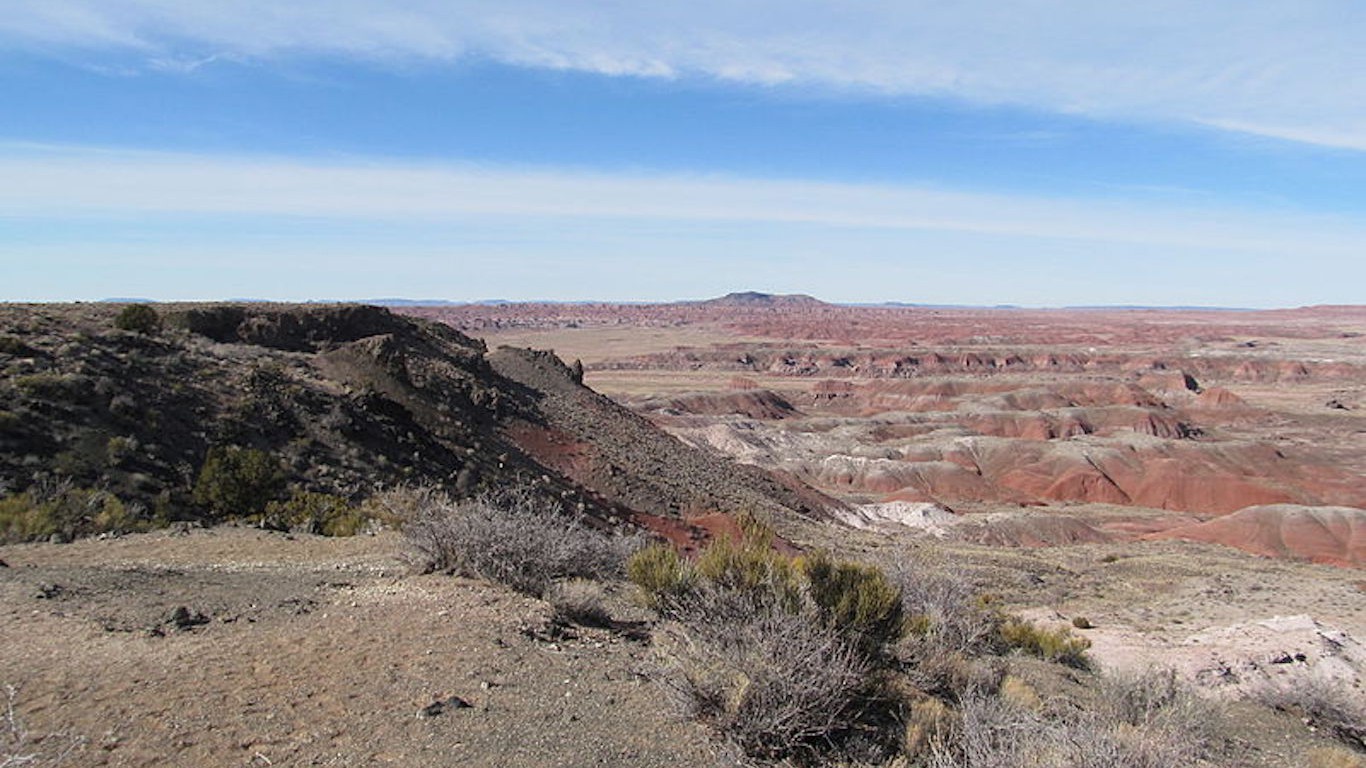
3. Arizona
>Bluest county: Apache County
Apache County is the bluest county in Arizona, with 66.4% of residents casting a ballot for Obama in 2012. While some of the bluest counties in each state tend to vote for Democratic candidates far more often than for Republican candidates in the House and Senate, other counties are more even in their representation. Apache County, for example, has helped send both Democrats and Republicans to the House over the last 10 years. Rep. Ann Kirkpatrick, a Democrat, now occupies the seat. Meanwhile, the senators from Arizona, Jeff Flake and John McCain, are both Republicans.
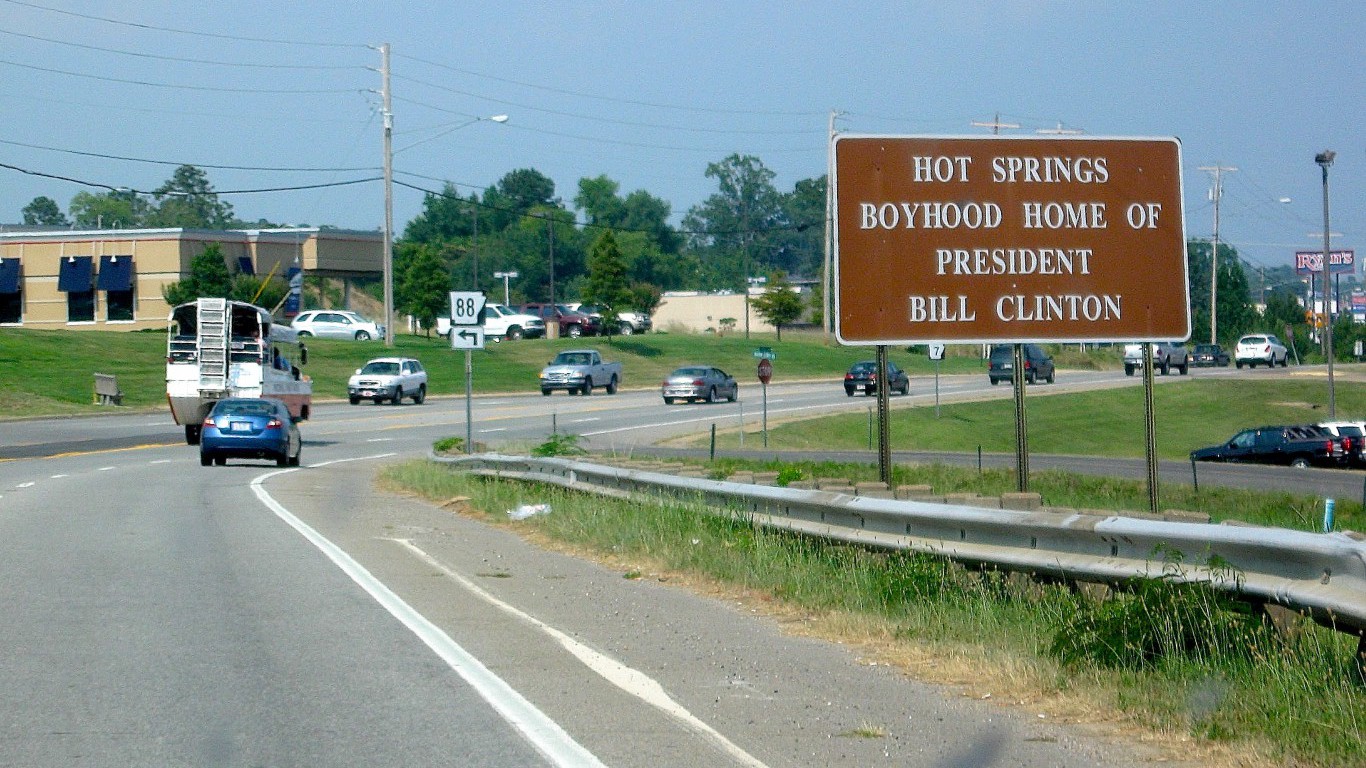
4. Arkansas
>Bluest county: Jefferson County
Republicans John Boozman and Tom Cotton currently serve Arkansas as senators in the U.S. Congress, reflecting relatively strong support for the party among state residents. Some Arkansans, however, lean far more Democratic. In Jefferson County, the bluest county in the state, 63.8% of voters cast a ballot for Obama in 2012. Jefferson County helped send both Democrats and Republicans to the House over the last 10 years, however. Rep. Bruce Westerman, a Republican, now occupies the seat.
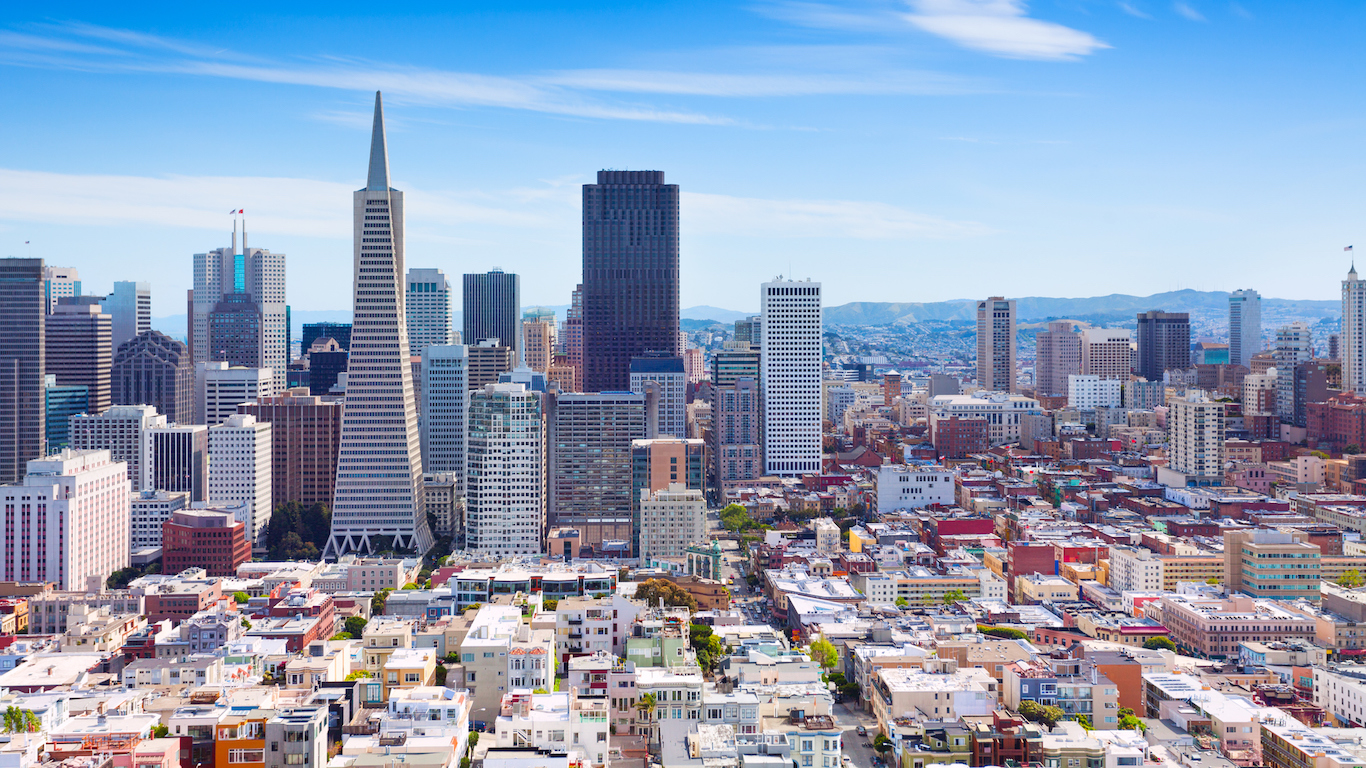
5. California
>Bluest county: San Francisco County
Both of California’s U.S. senators are Democrats. Residents of San Francisco County are perhaps the most likely to support the party. Obama won 83.4% of the votes in the area, the highest share of any county in California. In addition to sending a Democrat to the White House, county voters helped send a Democrat to the U.S. House of Representatives in each of the last five congressional elections.
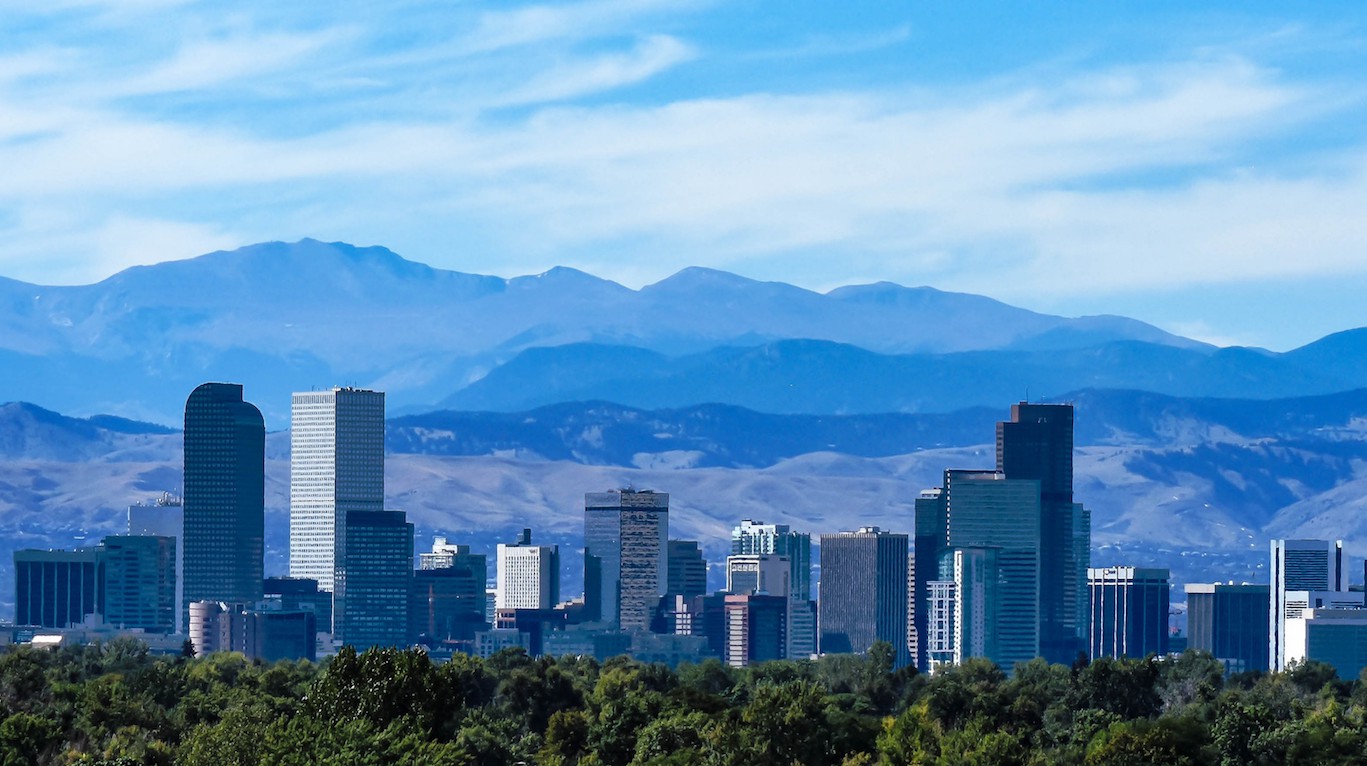
6. Colorado
>Bluest county: Denver County
Obama won 73.5% of the votes in Denver County, the highest share of any county in Colorado. In addition to voting to send a Democrat to the White House, the county sent a Democrat to the U.S. House of Representatives in each of the last five congressional elections. Unlike most Democratic-leaning areas, where incomes tend to be lower than in Republican-leaning regions, the county’s median household income of $51,800 is nearly in line with the national median of $52,482.
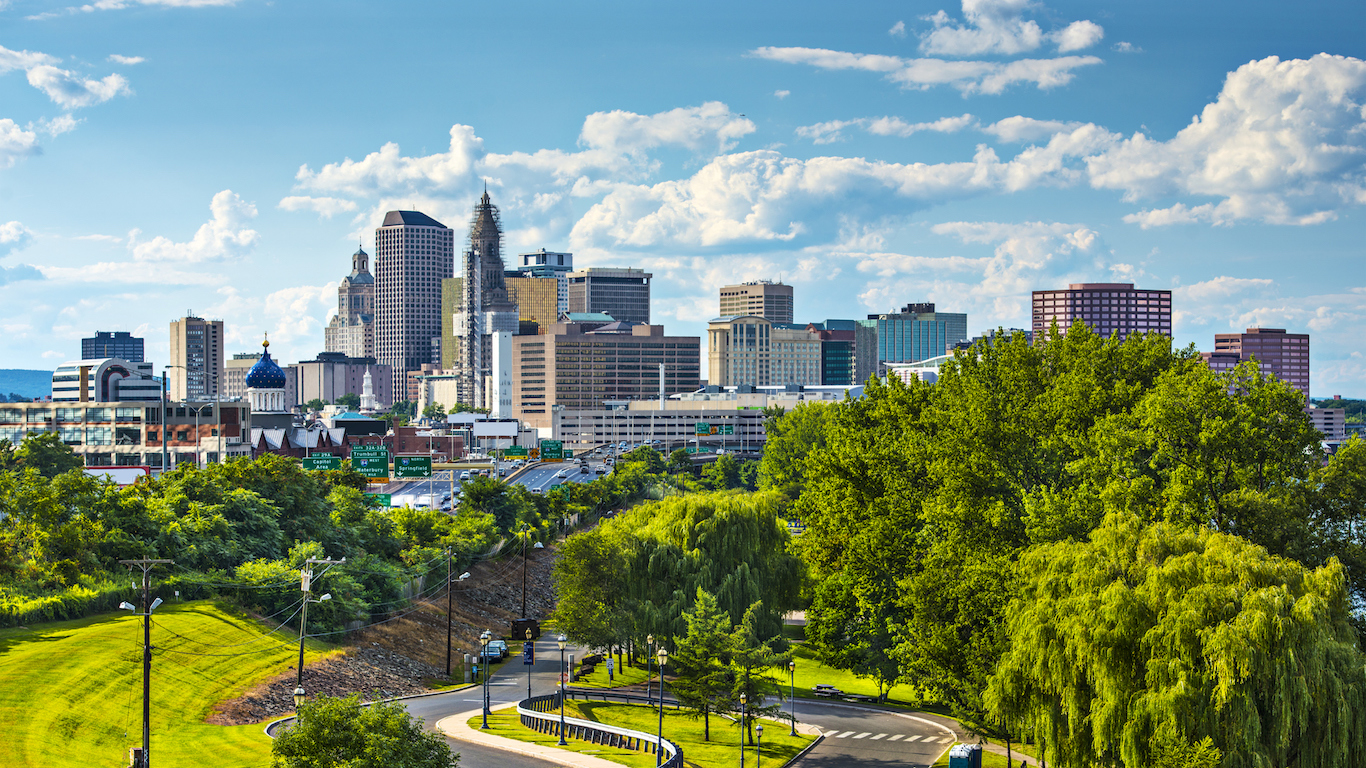
7. Connecticut
>Bluest county: Hartford County
Obama won 62.2% of the votes in Hartford County, a larger share than in any other county in the state. Not only were Hartford County residents more likely to prefer a Democrat in the White House, but they also sent a Democrat to the U.S. House of Representatives in each of the last five congressional elections. Democrat John B. Larson is currently the House representative for Hartford county, the bluest county in Connecticut.
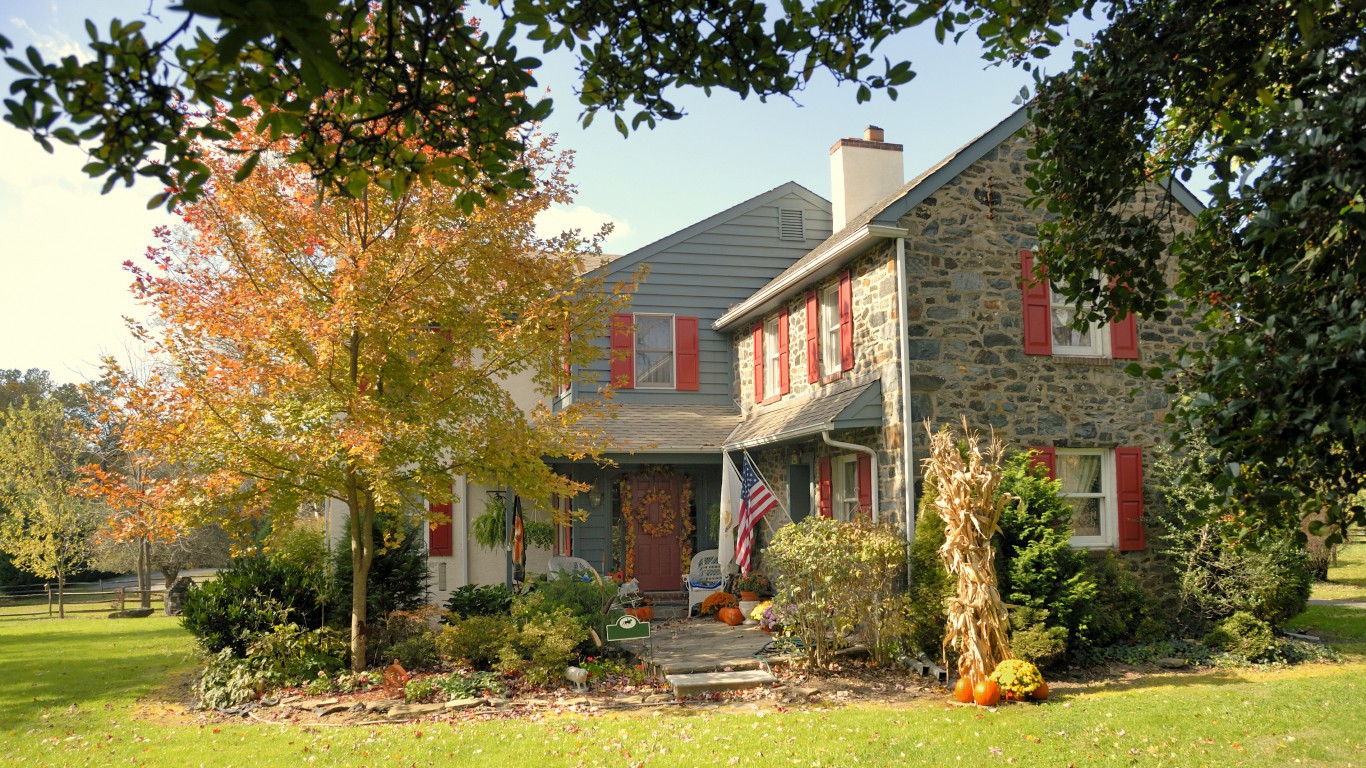
8. Delaware
>Bluest county: New Castle County
New Castle County is the bluest county in Delaware, with 66.3% of voters casting a ballot for Obama in 2012. The bluest counties in each state generally elect a Democratic over a Republican representative, but some blue counties have voted in members of both parties over the years. New Castle County is one such example. The county sent both Democrats and Republicans to the House over the last 10 years. Though Rep. John Carney, a Democrat, now occupies the seat, Republican Michael Castle preceded him, serving his final term in the 111th congress.
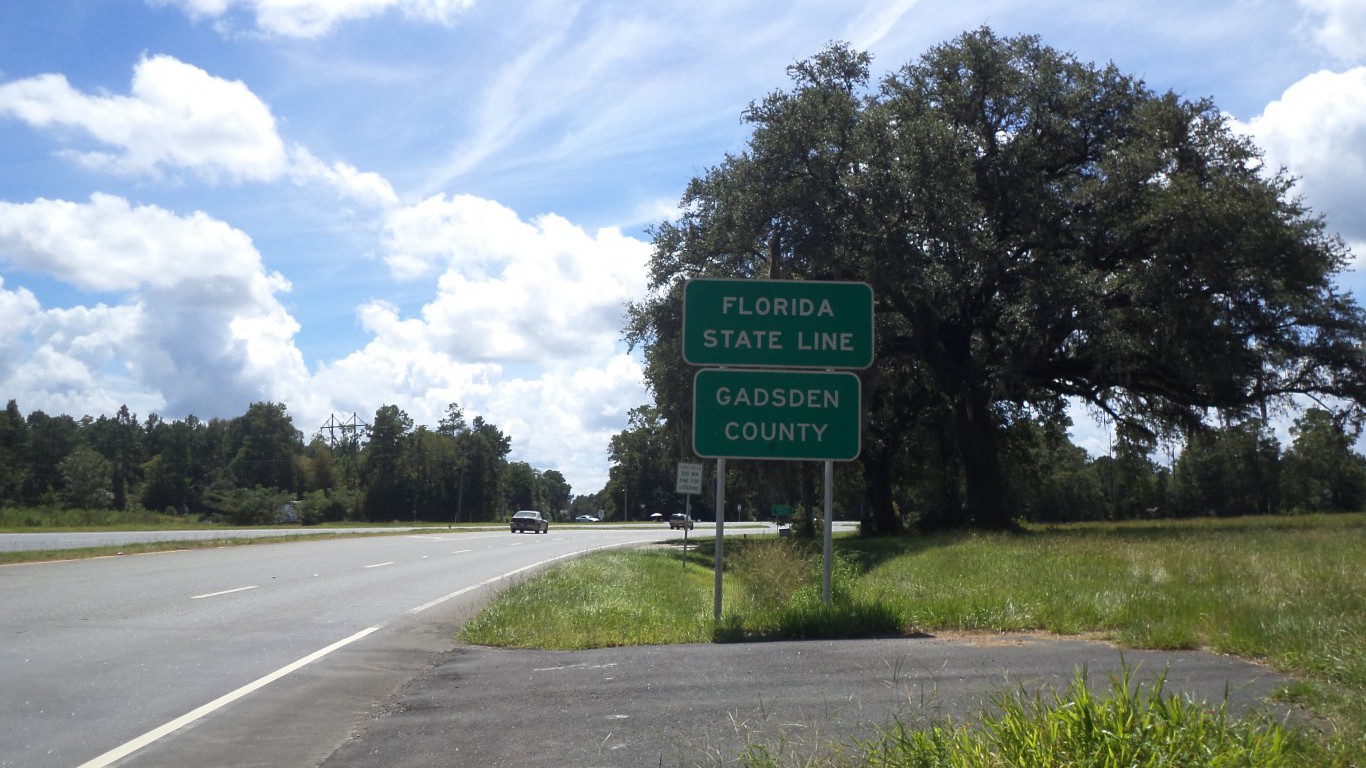
9. Florida
>Bluest county: Gadsden County
Gadsden County is the bluest county in Florida. Of the county’s roughly 22,500 voters in November 2012, nearly 16,000 cast a ballot for Obama. While some of the bluest counties in each state consistently elect Democrats to Congress, other counties have voted on both sides of the party line. Gadsden County, for example, sent both Democrats and Republicans to the House over the last 10 years. Rep. Gwen Graham, a Democrat, now occupies the seat. Marco Rubio, a candidate for the Republican presidential nomination, represents the Sunshine State in the U.S. Senate.
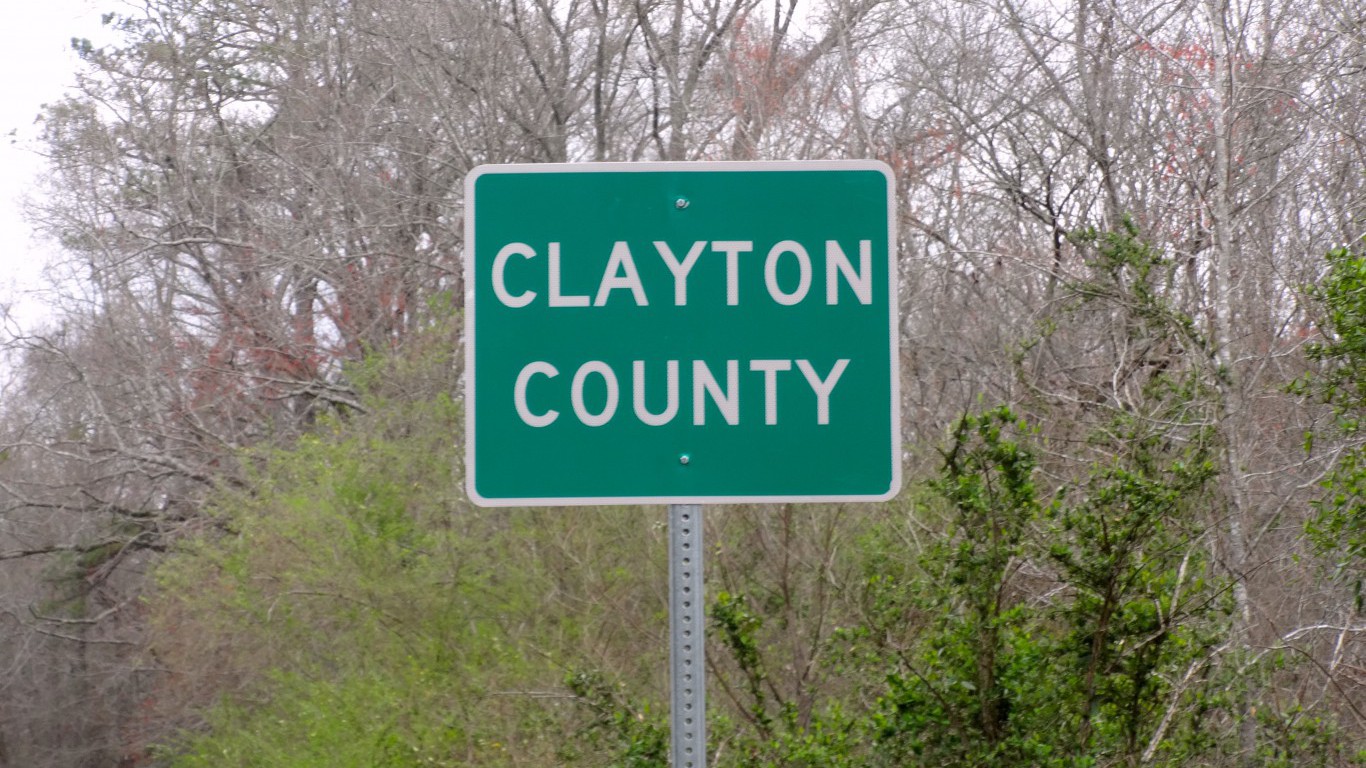
10. Georgia
>Bluest county: Clayton County
Though Romney won Georgia, the vast majority of voters in the Peach State’s bluest county cast their ballot for Obama in 2012. Nearly 85% of voters in Clayton County cast a ballot for Obama. In addition to sending a Democrat to the White House, the county sent a Democrat to the U.S. House of Representatives in each of the last five congressional elections.
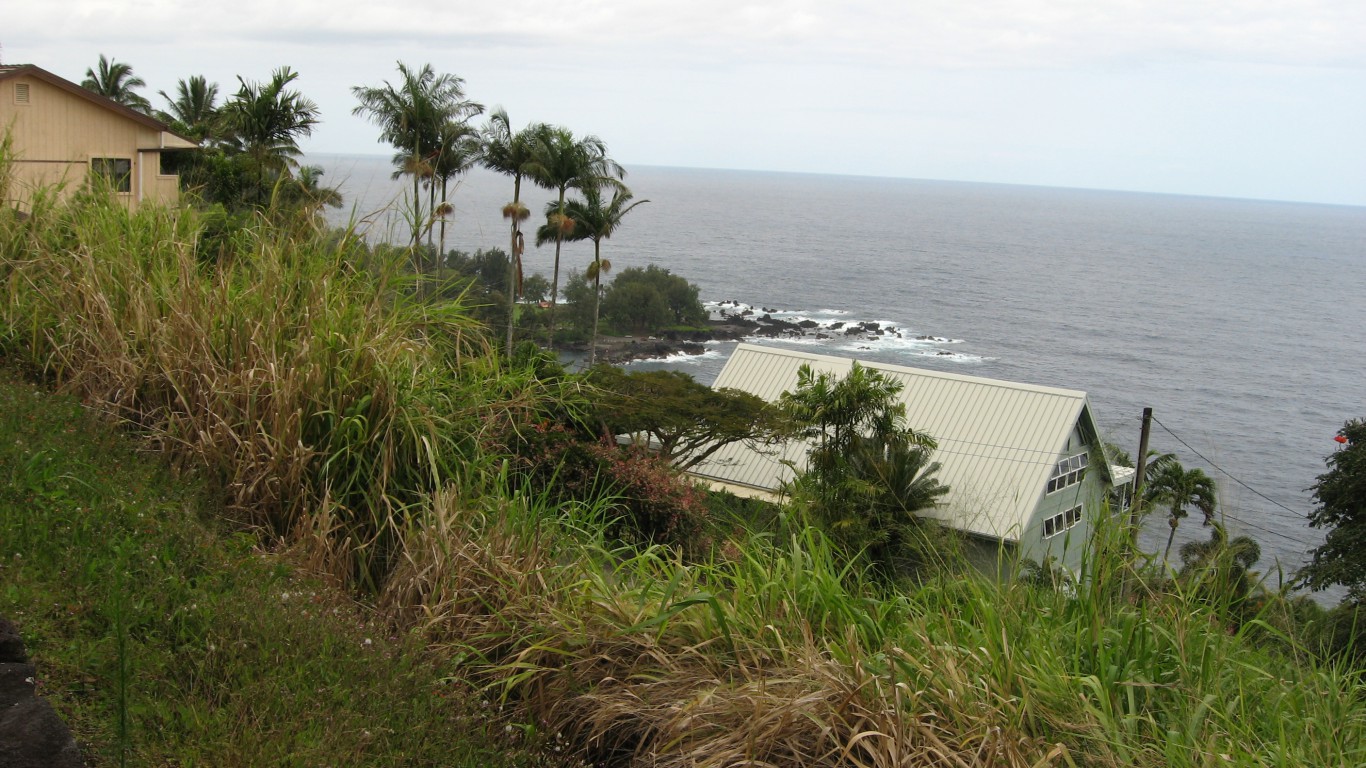
11. Hawaii
>Bluest county: Hawaii County
Obama received almost three-fourths of the votes in Hawaii County, his birthplace, the highest share of any county in Hawaii. Hawaii is a traditionally blue state, and even its reddest county cast 68.9% of its votes for Obama. Like in many predominantly Democratic-leaning areas, the 30.8% of residents who identify as white in Hawaii County is a smaller share than the 62.8% of Americans who do overall.
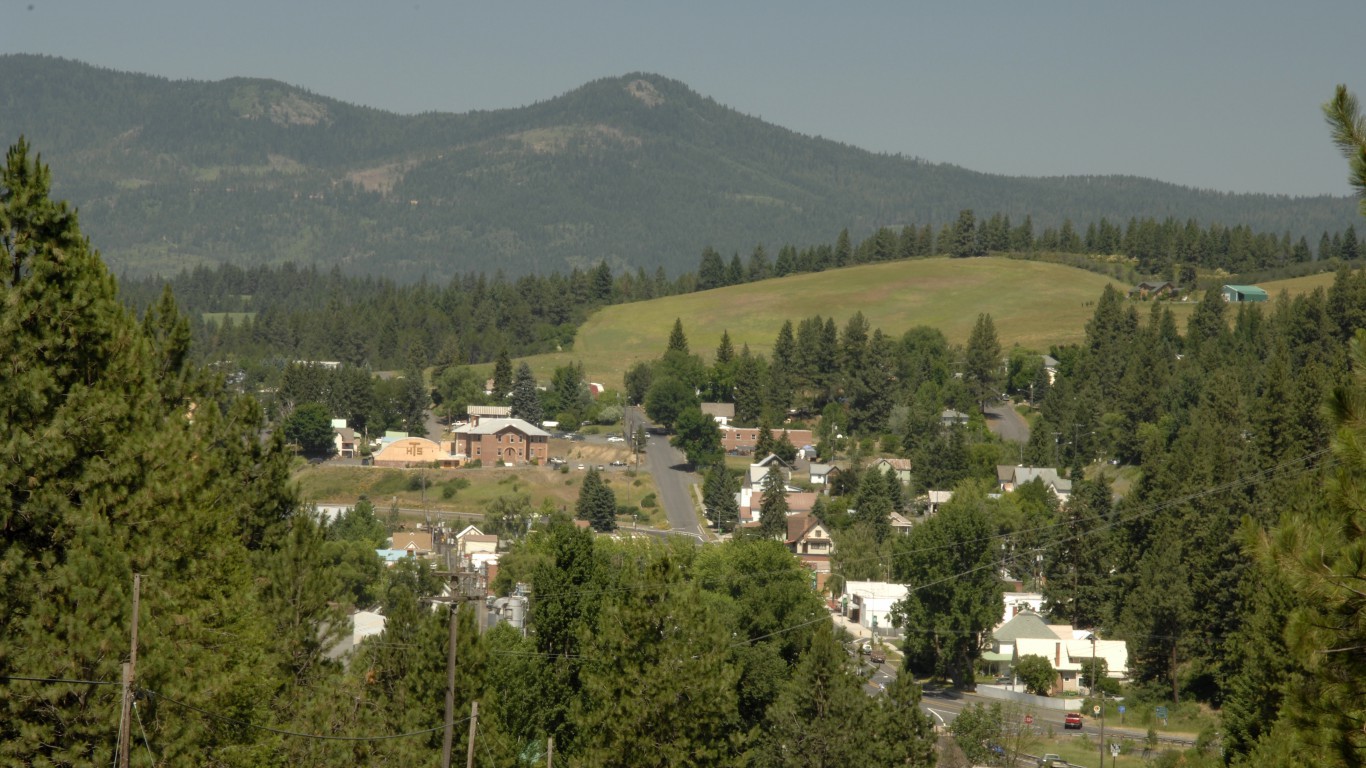
12. Idaho
>Bluest county: Latah County
Idaho is one of the reddest states in the country, with 65.0% of votes going for Romney in 2012. Political leanings are not uniform across the state, however. Latah County cast only 45.3% of its votes for Romney, helping make it the bluest county in the state. The county has been represented by both Democrats and Republicans over the past decade. Currently, Rep. Raul Labrador, a Republican, occupies the seat of Idaho’s 1st Congressional District.
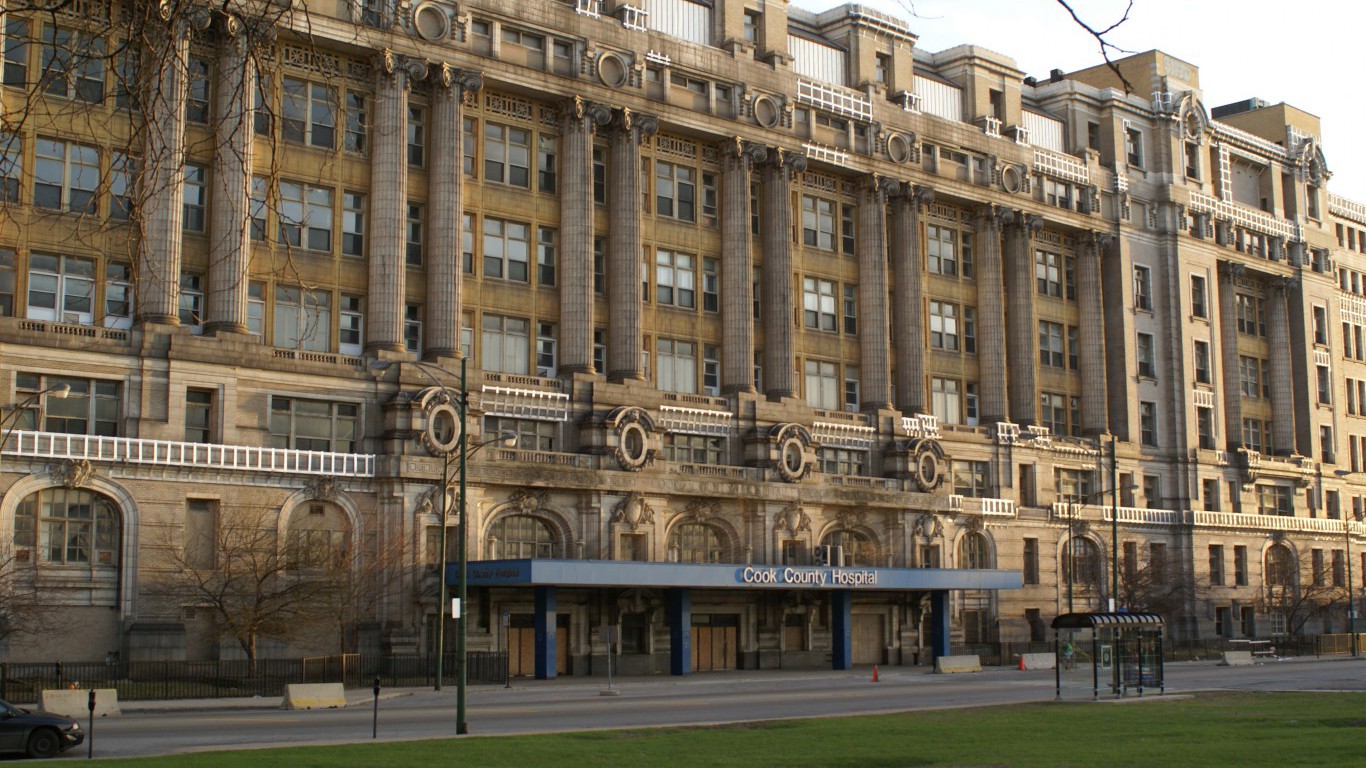
13. Illinois
>Bluest county: Cook County
Obama started his political career as a community organizer in Chicago, the seat of Cook County. He went on to be elected to the Illinois Senate by the largest margin in state’s history. In the 2012 election, Obama received nearly three-quarters of votes in Cook County, the bluest in Illinois. While Cook overwhelmingly favored a Democrat in the presidential election, in the past five years both Democrats and Republicans have won House seats in the county’s congressional districts.
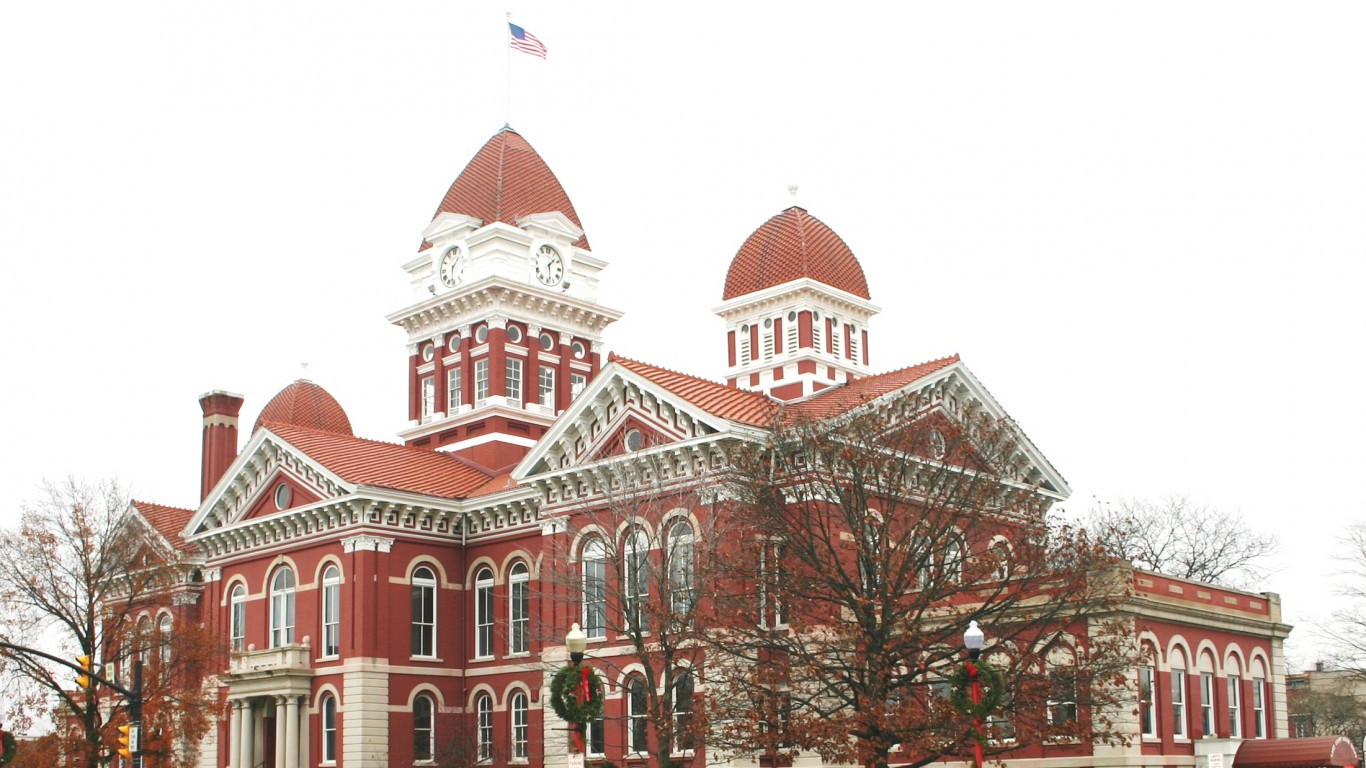
14. Indiana
>Bluest county: Lake County
Obama won 64.9% of the votes in Lake County, which borders Illinois on Lake Michigan, under an hour by car from Chicago. This was the highest share of any county in Indiana. In addition to sending a Democrat to the White House, the county voted to send a Democrat — Pete Visclosky — to the U.S. House of Representatives in each of the last five congressional elections.
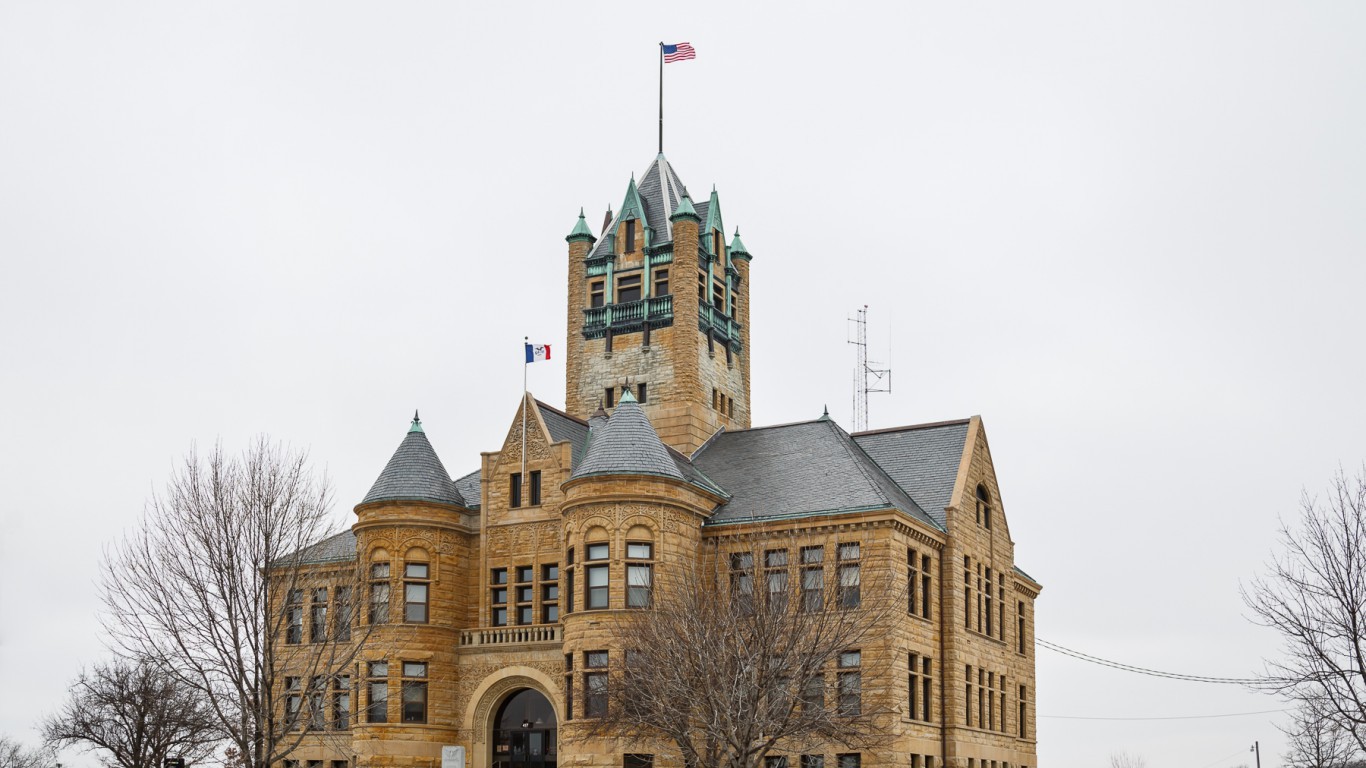
15. Iowa
>Bluest county: Johnson County
Obama won 66.9% of the votes in Johnson County, the highest share of any county in Iowa. Communities with high education levels tend to be relatively left-leaning. In Johnson County, 94.8% of adults have a high school diploma and 51.7% have at least a bachelor’s degree, each higher than the respective national shares of 86.3% and 29.3%. In addition to sending a Democrat to the White House, the county has sent a Democrat to the U.S. House of Representatives in each of the last five congressional elections.
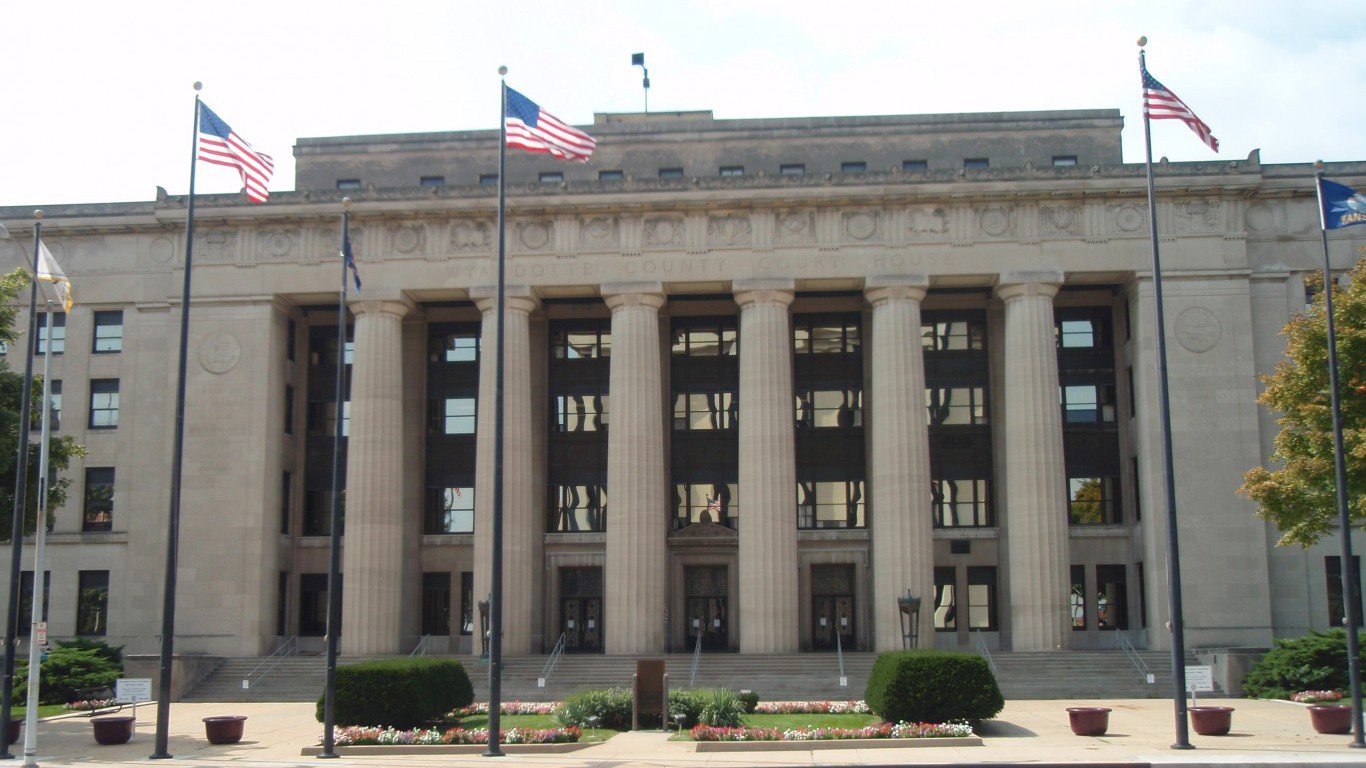
16. Kansas
>Bluest county: Wyandotte County
Wyandotte County is the bluest county in Kansas, with 67.3% of voters casting a ballot for Obama in 2012. The bluest counties in each state generally elect a Democratic over a Republican representative, but some blue counties have voted in members of both parties over the years. Wyandotte County is one such example. The county sent both Democrats and Republicans to the House over the last 10 years. Rep. Kevin Yoder, a Republican, now occupies the seat.
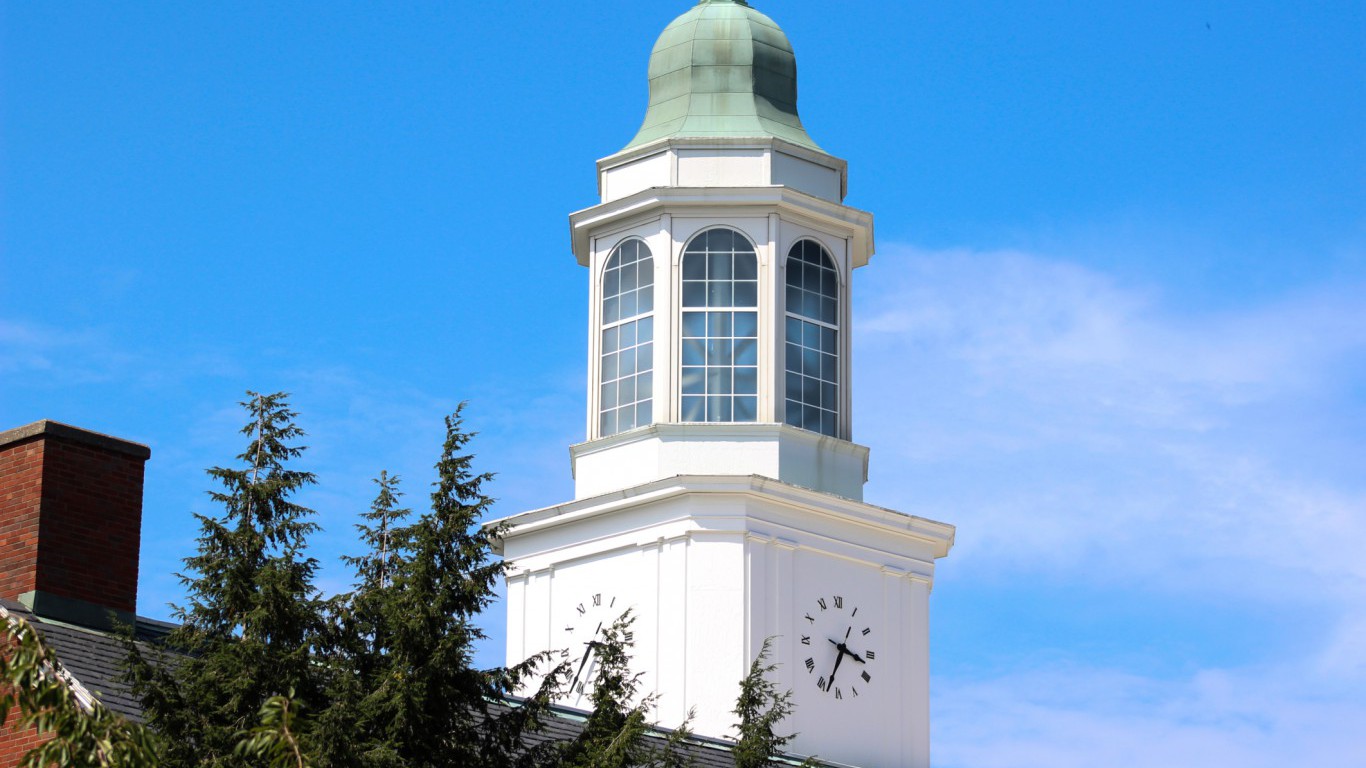
17. Kentucky
>Bluest county: Fayette County
Obama narrowly won Fayette County with 49.3% of total votes cast. Senate Majority Leader Mitch McConnell and Sen. Rand Paul currently represent Kentucky’s 6th Congressional District, which encompasses Fayette County. Despite the relatively strong Republican support in the area, Fayette County is more Democratic-leaning than any other Kentucky county. Also, as in Democratic-leaning areas in a majority of states, Fayette County residents are relatively well educated. More than 40% of the area’s adults have at least a bachelor’s degree, far higher than the 29.3% of adults nationwide.
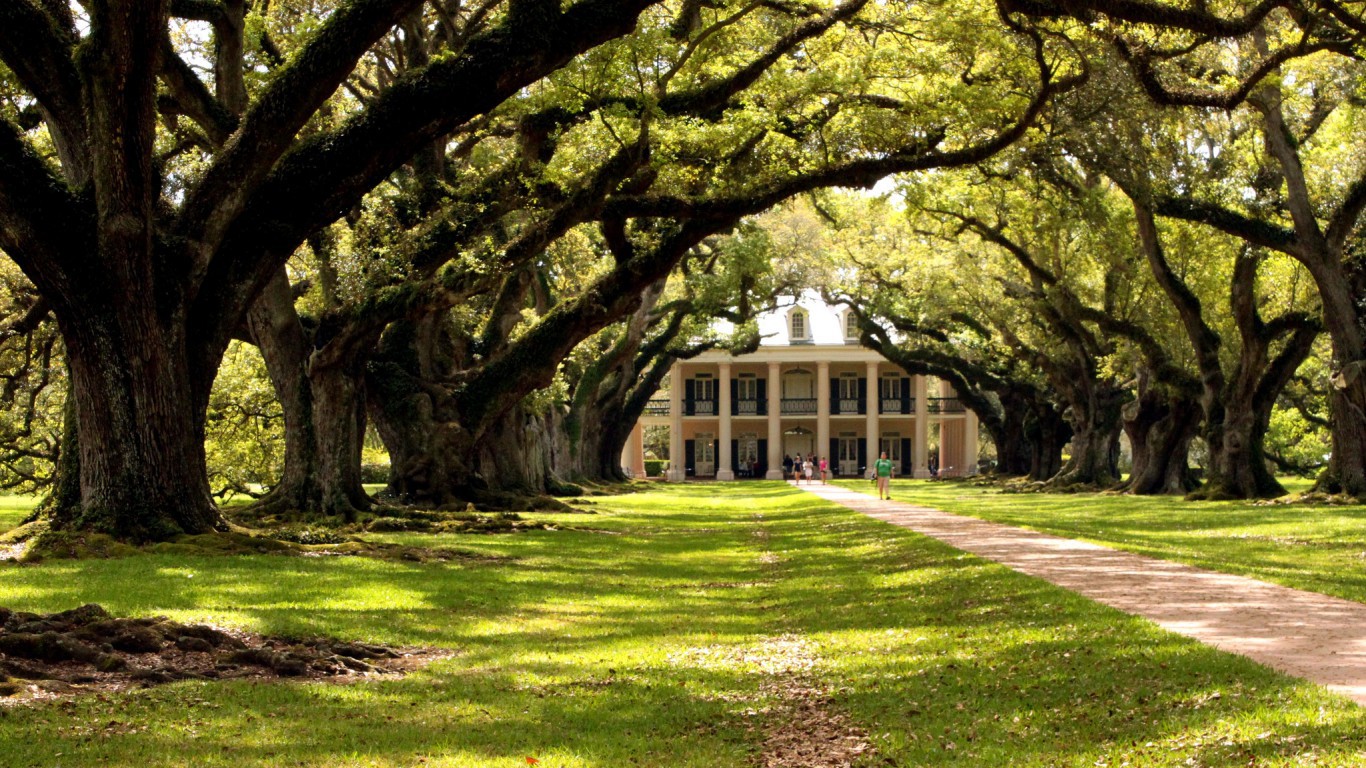
18. Louisiana
>Bluest county: St. James Parish
St. James Parish is the bluest county in Louisiana, with 56.9% of voters casting a ballot for Obama in 2012. Additionally, the state’s 2nd Congressional District, which includes St. James Parish, voted to help send Rep. Cedric Richmond, a Democrat, to his third term in the House. Across the state, Louisianans seem to trend Republican — 58% of Louisiana voters cast a ballot for Romney in 2012.
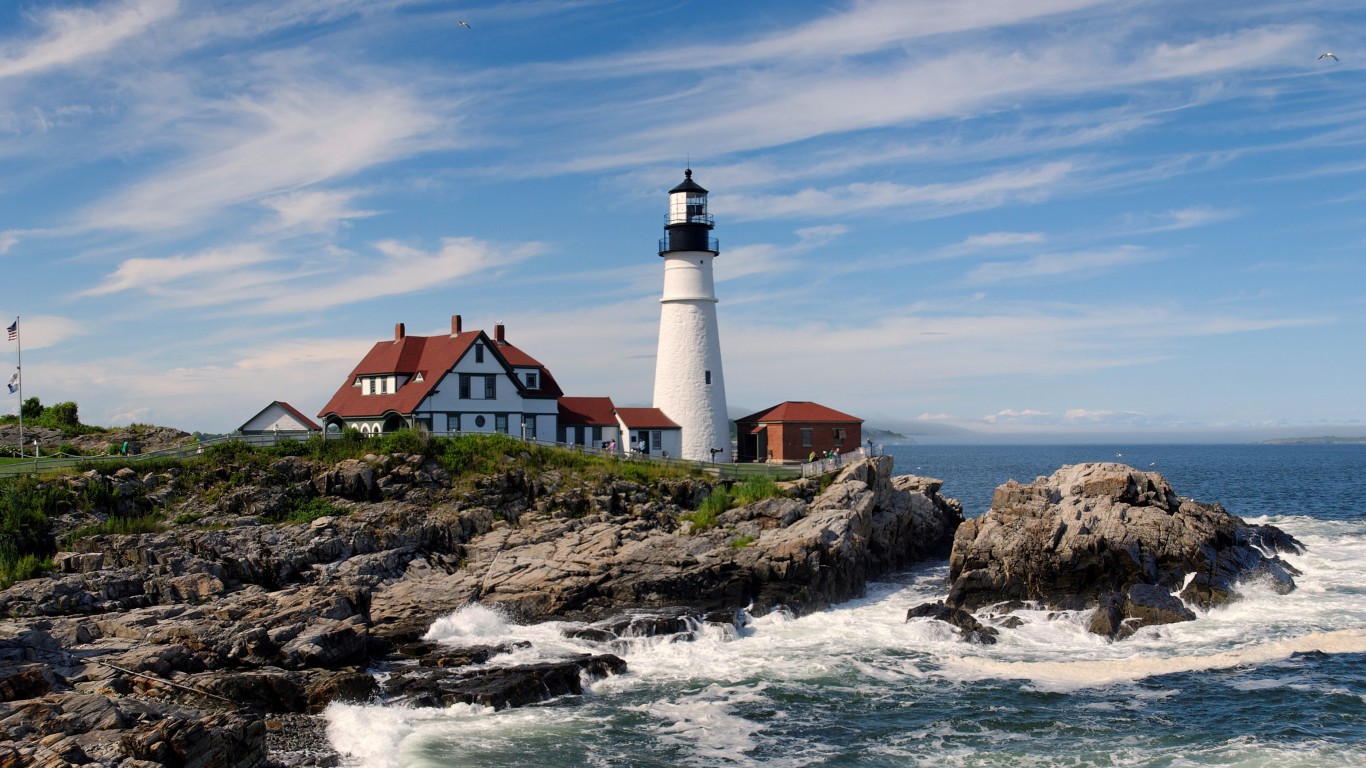
19. Maine
>Bluest county: Cumberland County
Obama won 60.5% of the votes in Cumberland County, the largest share of any county in Maine. Unlike many of the most Democratic-leaning areas in other states, there are relatively few non-white residents in Cumberland. More than 91% of county residents identify as white, far higher than the 62.8% of Americans who identify as white. Cumberland, which includes the city of Portland, is located in Maine’s 1st District, and is represented by Rep. Chellie Pingree, a Democrat.
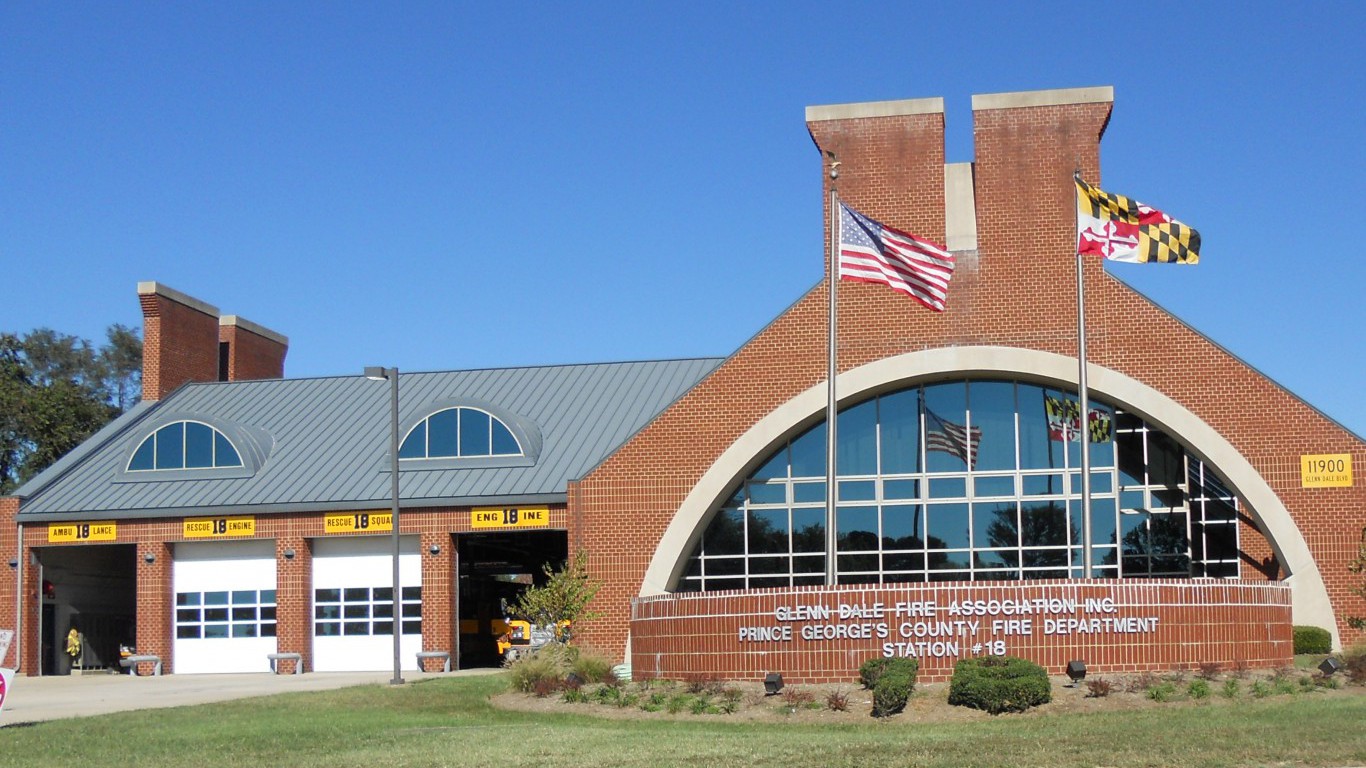
20. Maryland
>Bluest county: Prince George’s County
Obama won 90.1% of the votes in Prince George’s County, the largest share of any county in Maryland and the third highest share of any county nationwide. In addition to casting a ballot for Obama in 2012, the county has historically been represented by Democrats in the House and Senate, and the 114th congressional session is no exception. Sens. Ben Cardin and Barbara Mikulski and Reps. Donna Edwards and Steny Hoyer, both of whom represent districts within Prince George’s County, are Democrats.
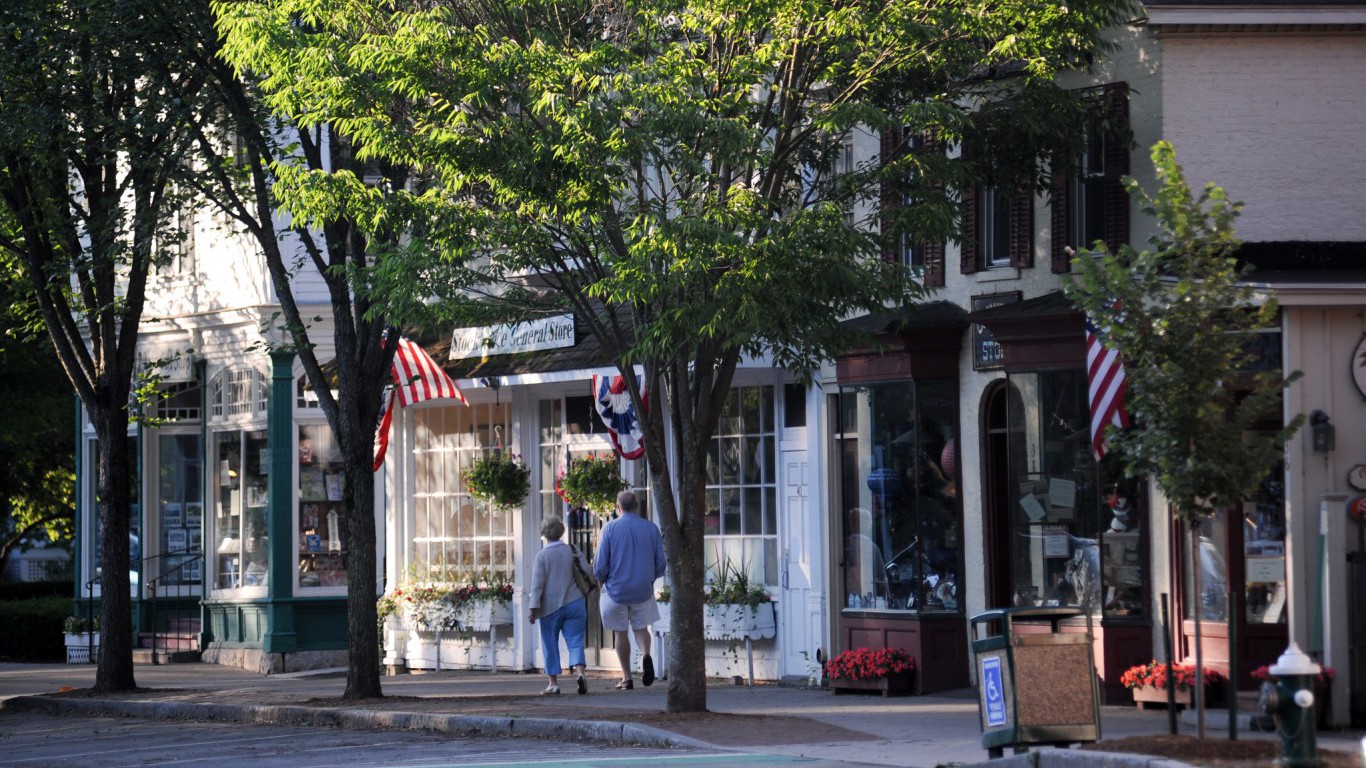
21. Massachusetts
>Bluest county: Berkshire County
Obama won 75.8% of the votes in Berkshire County, the second highest share after Suffolk County, where Obama secured 77.6% of the vote. Berkshire County voters sent a Democrat to the U.S. House of Representatives in each of the last five congressional elections. The senators from Massachusetts, Ed Markey and Elizabeth Warren, are also both Democrats.
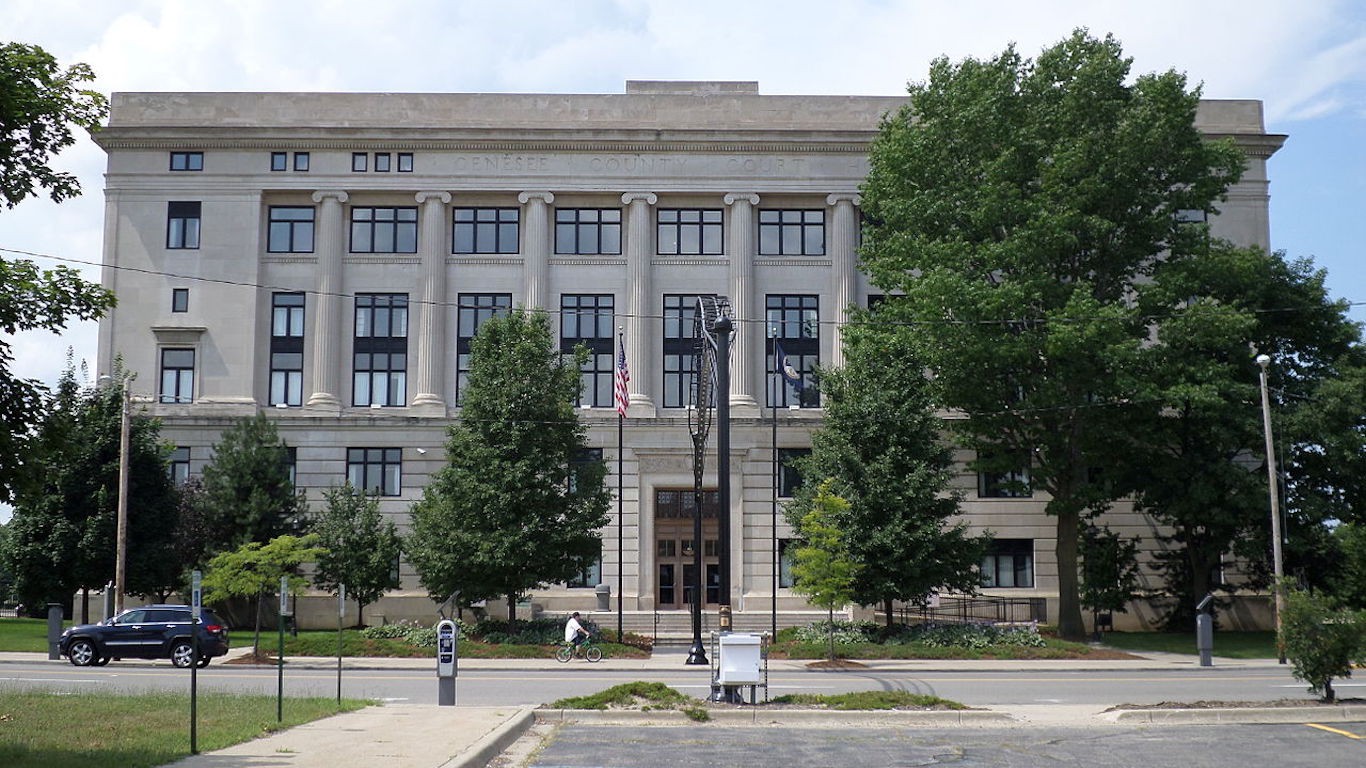
22. Michigan
>Bluest county: Genesee County
Genesee County has sent a Democrat to the U.S. House of Representatives in each of the last five congressional elections. Also, 63.6% of Genesee County voters chose Obama over Romney in 2012, one of the highest shares of any county in Michigan. Like many counties inclined to vote Democratic, Genesee County’s median household income of $41,879 is substantially lower than the national median of $52,482. Additionally, 21.2% of Genesee County residents live in poverty compared to 15.6% of Americans.
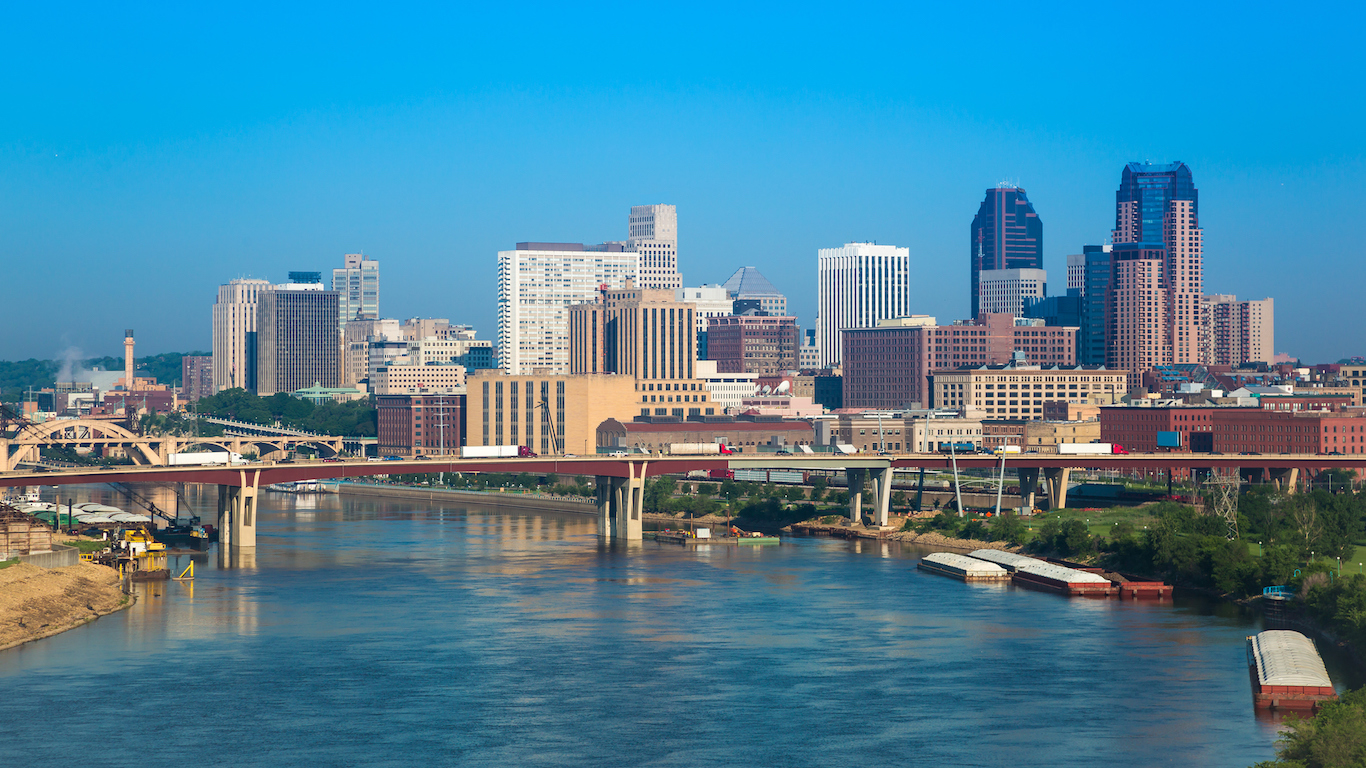
23. Minnesota
>Bluest county: Ramsey County
In Ramsey County, 66.6% of voters cast a ballot for Obama in 2012, a higher share than in any other county in Minnesota. Compared to Romney, Obama received nearly 100,000 more votes in the county. Ramsey voters also sent a Democrat to the U.S. House of Representatives in each of the last five congressional elections. With two Democratic senators and all 10 of its electoral votes going to Obama in 2012, Minnesota is one of the bluest counties in the nation.
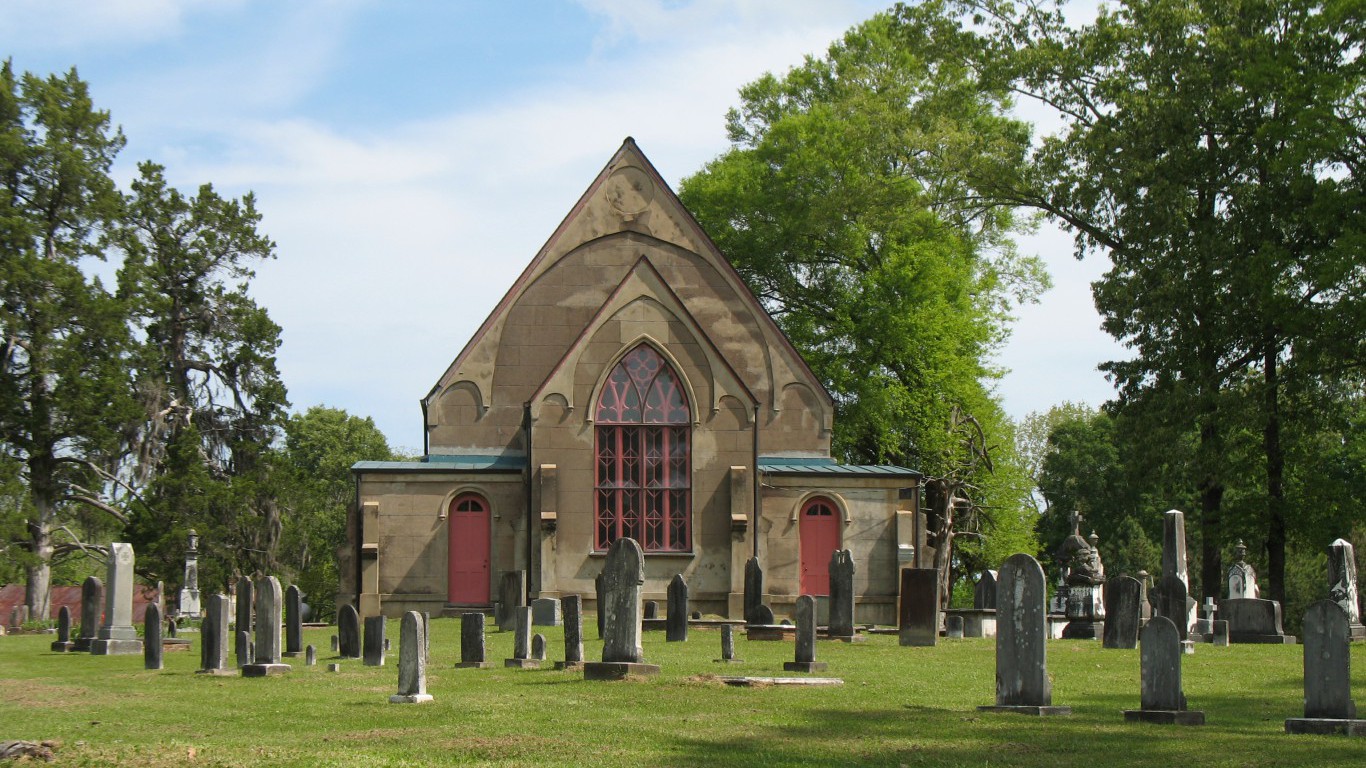
24. Mississippi
>Bluest county: Jefferson County
Though Romney won Mississippi in 2012, Obama won 88.7% of the votes in Jefferson County, the highest share of any county in the state. And despite its location in a traditionally red state, Jefferson County voters have sent a Democrat to the U.S. House of Representatives in each of the last five congressional elections. Incomes tend to be lower in counties that vote democratic and Jefferson County is no exception. The area’s median household income of $23,480 is less than half the corresponding national figure of $52,046.

25. Missouri
>Bluest county: St. Louis County
Though Missouri went to Romney in 2012, Obama won 82.7% of the votes in St. Louis, the highest share of any county in the state. In each of the last five congressional elections, St. Louis sent Rep. William L Clay Jr., a Democrat, to the U.S. House of Representatives. Democratic politicians are more likely to receive support from financially insecure voters than Republican candidates, and St. Louis residents are not as well-off as in many other areas. Nearly 28% of St. Louis residents live in poverty, nearly double the 15.6% nationwide poverty rate.
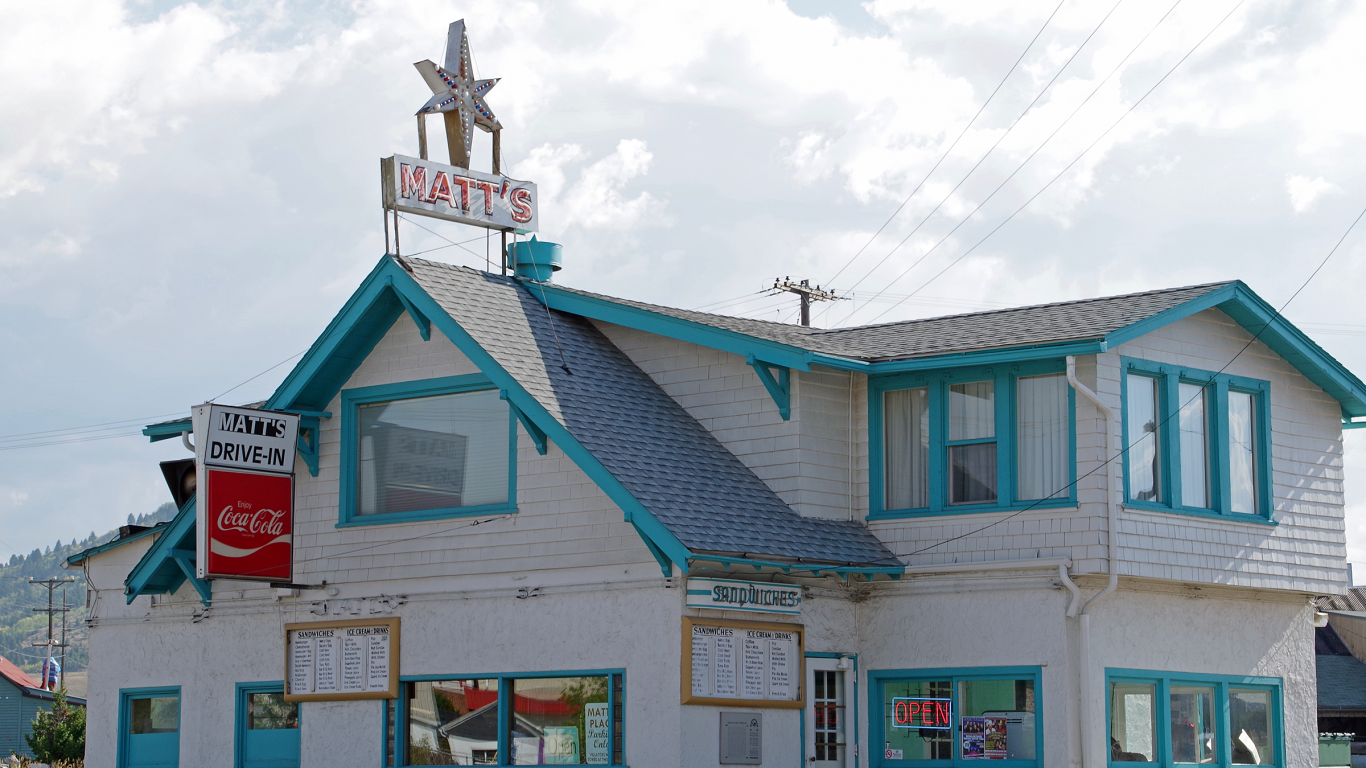
26. Montana
>Bluest county: Silver Bow County
Silver Bow’s Democratic roots date back to its 19th century copper mining industry and the labor unions its workforce organized. Although the industry dissolved in the latter half of the 20th century, Democratic leaning remains. Close to two-thirds of voters cast a ballot for Obama in 2012, helping to make Silver Bow County the bluest county in Montana. As is the case in many Democratic areas, residents are less wealthy than the average American. The typical household in Silver Bow County earns $37,503 a year, about $16,000 less than the national median household income.
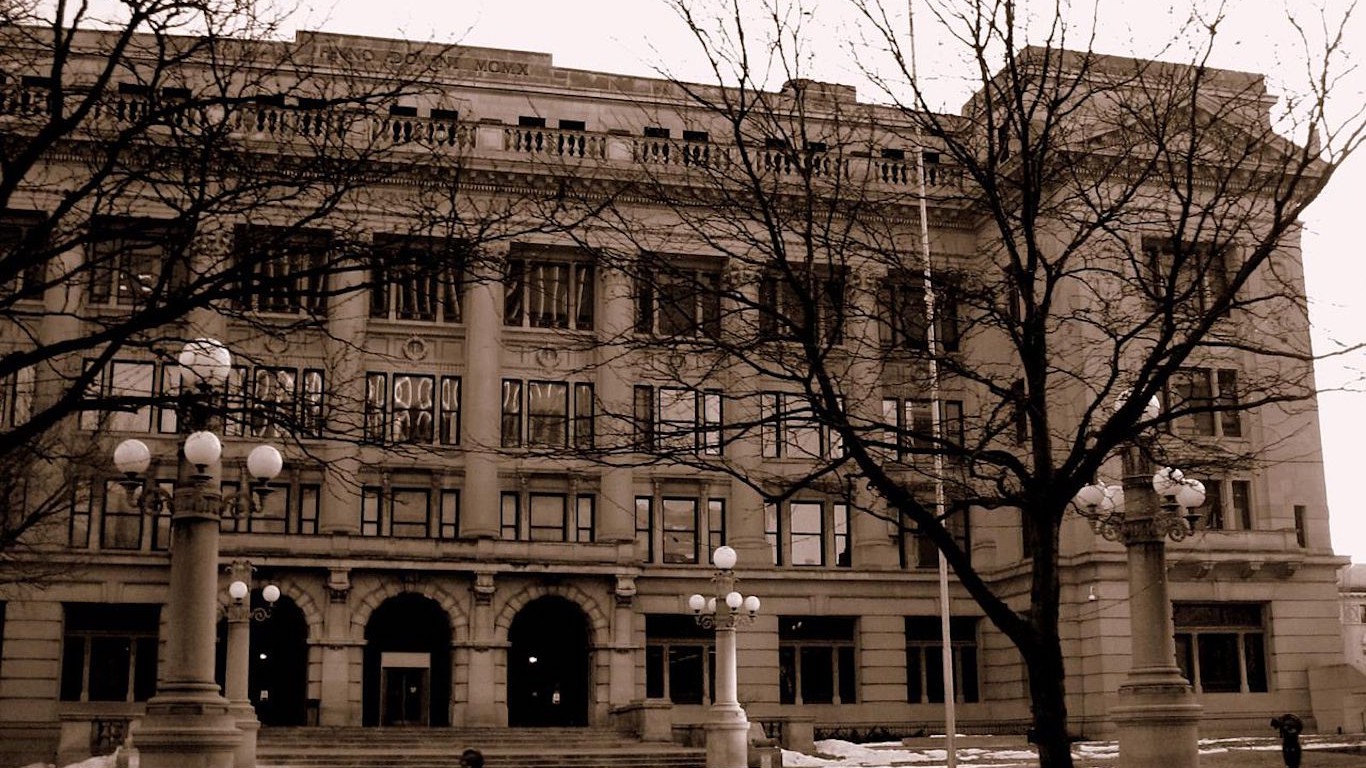
27. Nebraska
>Bluest county: Douglas County
One of the redder states in the country, 61.0% of Nebraska voters cast their ballot for Romney in 2012. Even the bluest county in the state, Douglas County, cast a majority of its votes for Romney. Nevertheless, the 47.2% of votes Obama received from Douglas County voters was the highest such share of any Nebraska county. Douglas County lies in Nebraska’s 2nd Congressional District, which recently elected its first Democratic House representative in over a decade — despite restrictions implemented in 2011 that Democrats claimed would shift more Republican voters into the area.
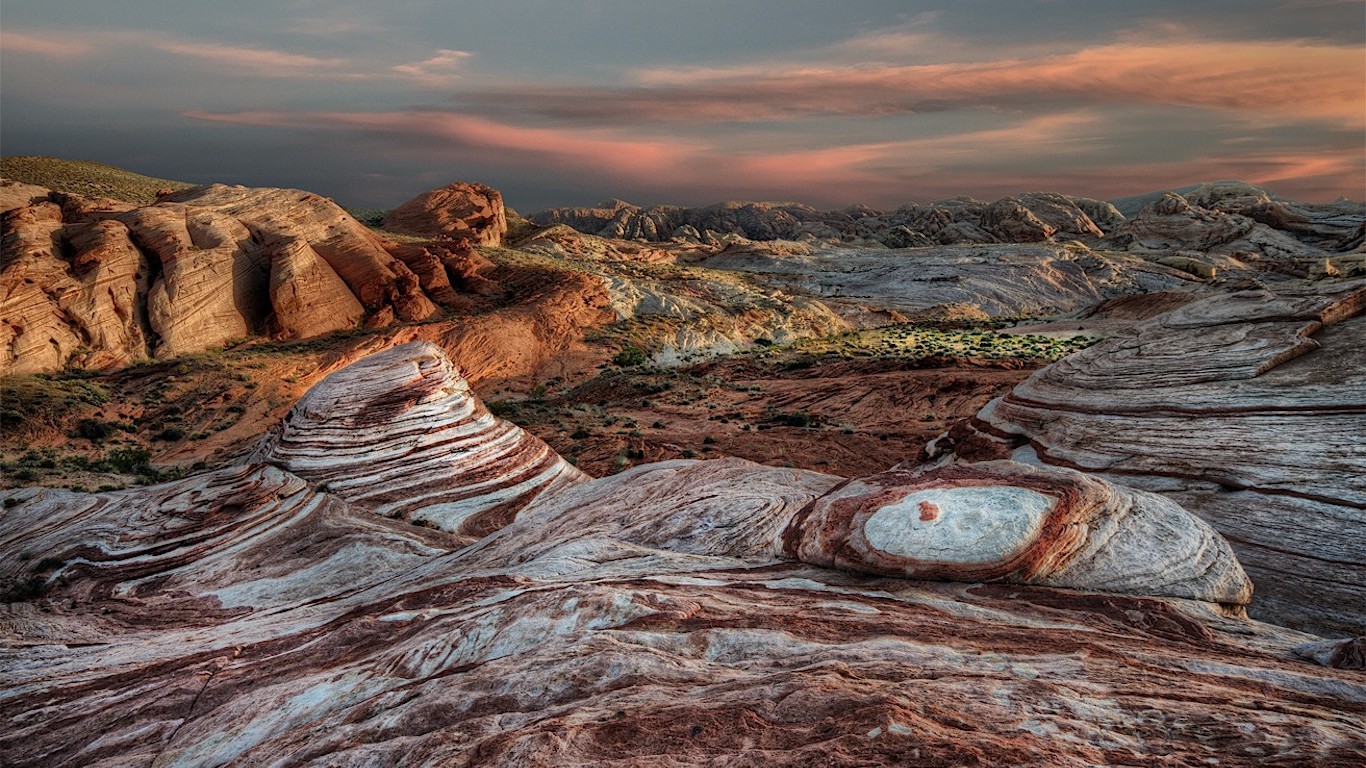
28. Nevada
>Bluest county: Clark County
Obama won 56.4% of the votes in Clark County, the highest share of any county in Nevada. The district reflects similar voting patterns as the state overall, as 52.0% of Nevada voters cast ballots for Obama. As a result of the 2010 Census, a new congressional district was created in Nevada that includes parts of Clark County. Democrat Steven Horsford became the first House representative elected in the district in 2012. In 2014, Republican Cresent Hardy became the second.
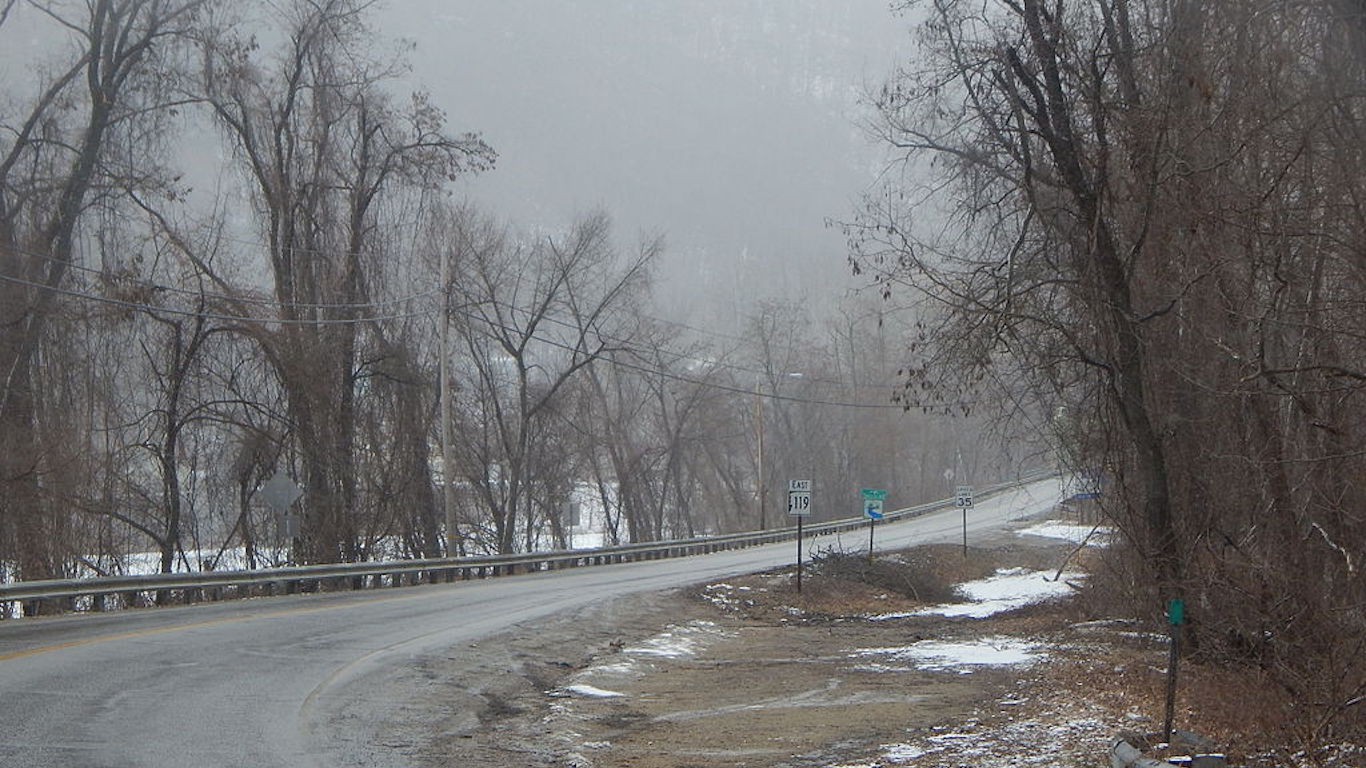
29. New Hampshire
>Bluest county: Cheshire County
With 46.0% of votes for Romney and 52.0% of votes for Obama, New Hampshire had one of the smallest margins of any state in the 2012 election. Cheshire County, however, was not as indecisive. Obama received 61.7% of county votes, the highest share of any New Hampshire county. Similarly, Romney’s 36.9% of the votes was the lowest share. In the last five congressional elections, New Hampshire’s 1st district which contains Cheshire County, elected a Democrat to the House of Representatives.
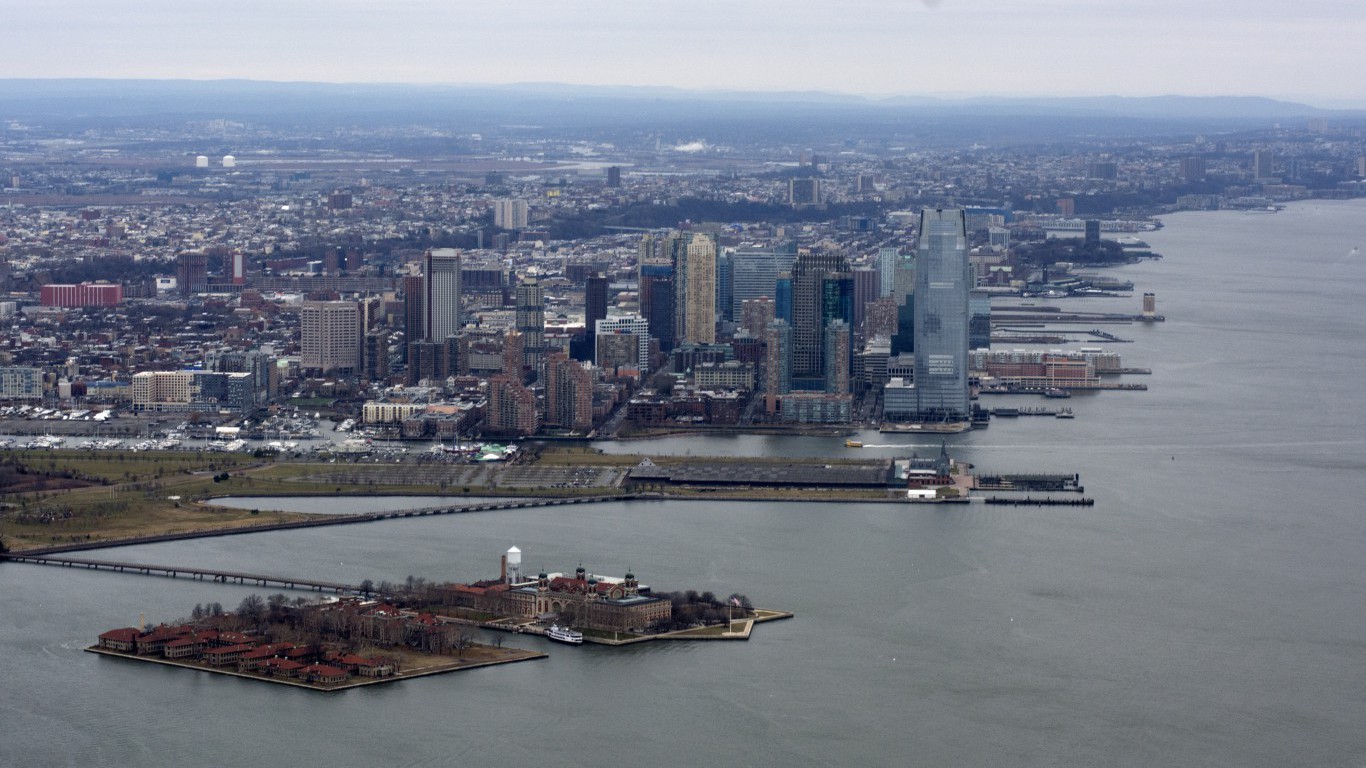
30. New Jersey
>Bluest county: Hudson County
Obama won 77.4% of the votes in Hudson County, the highest share of any county in New Jersey. Additionally, the three congressional districts that cover Hudson County have elected Democrats to the House of Representatives in each of the past five elections. Compared to Republican politicians, Democratic candidates often find greater support among minority groups. In Hudson County, less than 30% of residents identify as white, versus 62.8% of Americans.
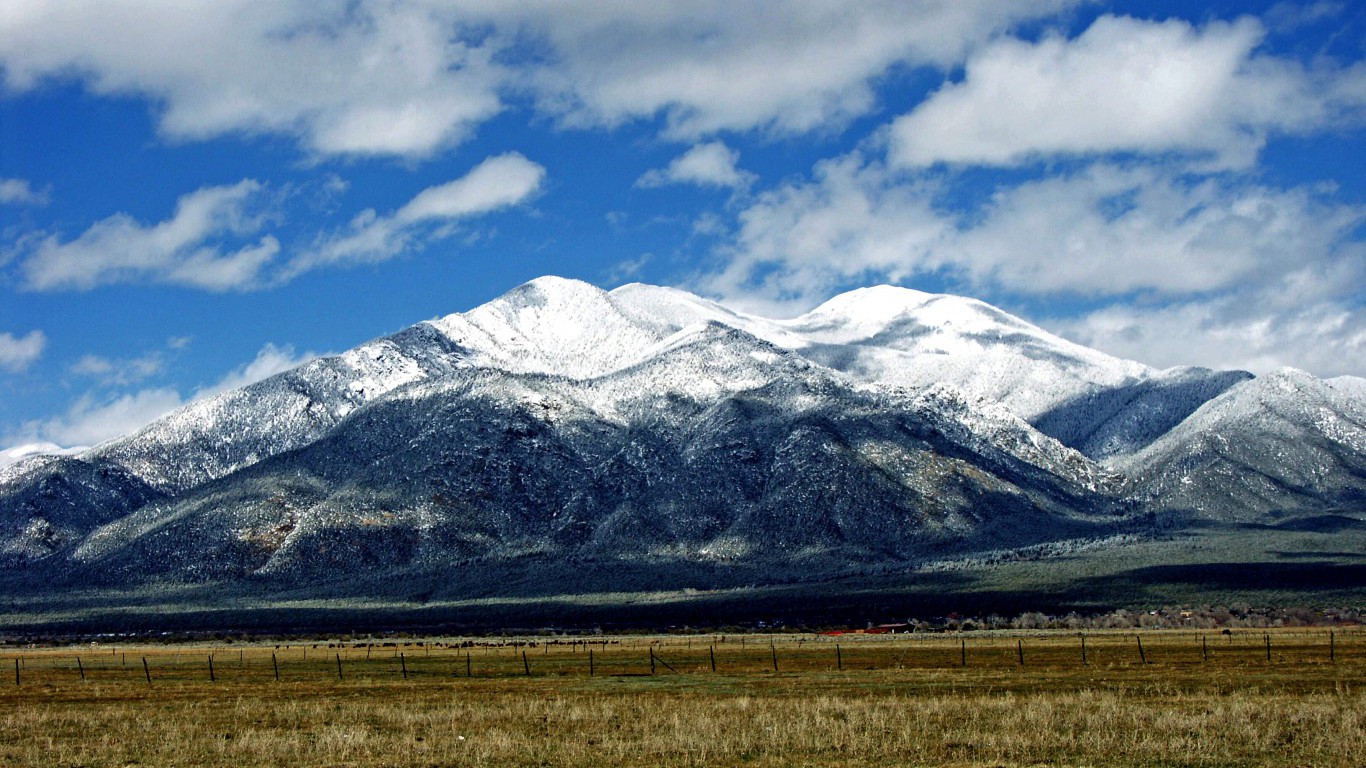
31. New Mexico
>Bluest county: Taos County
Obama won 78.1% of the votes in Taos County, the highest share of any county in New Mexico. In addition to supporting the Democratic bid for the White House, the county helped send a Democrat to the U.S. House of Representatives in each of the last five congressional elections. Rep. Ben R. Lujan, the current district representative, has served in the past four cycles. As is generally the case in predominantly Democratic areas, the median household income in Taos of $35,823 is lower than the national median income of $52,482. Additionally, more than 20.0% of Taos County residents live in poverty, compared to 15.6% of Americans.
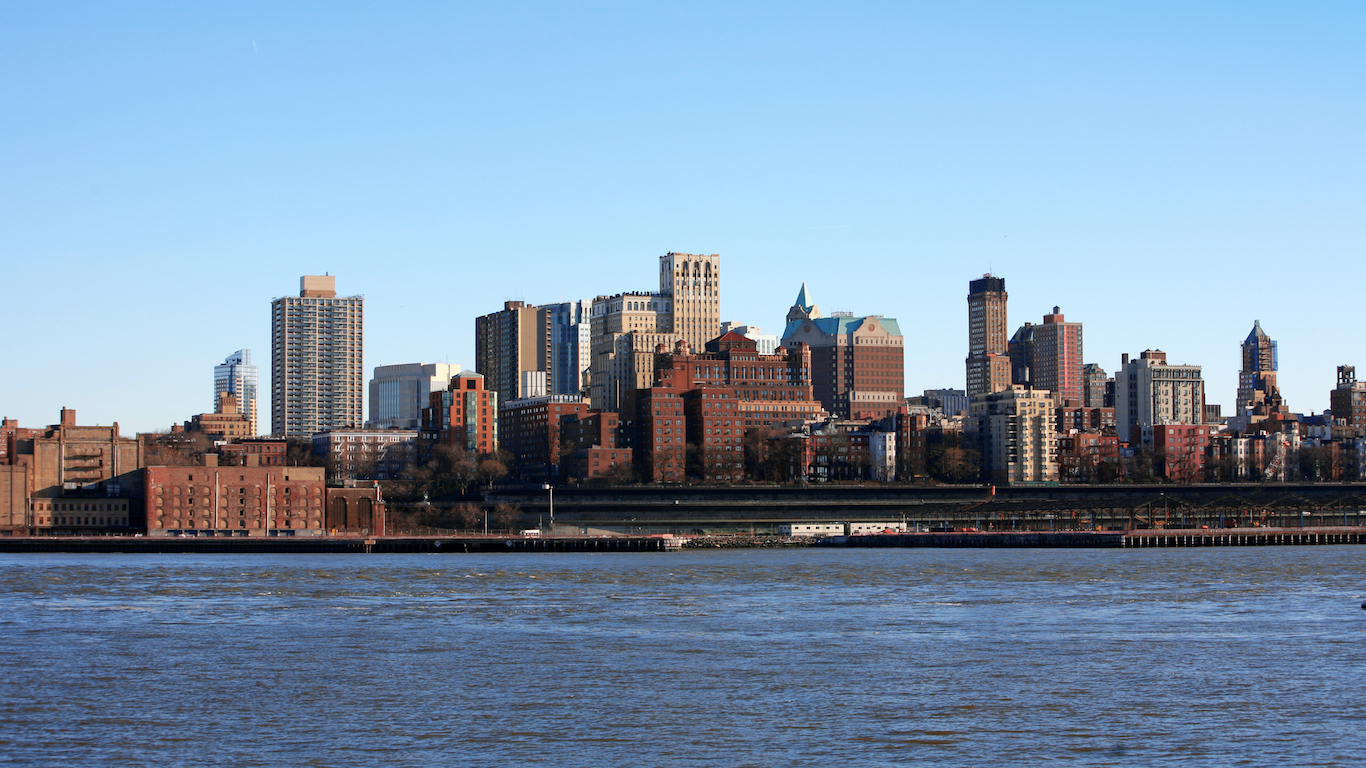
32. New York
>Bluest county: Bronx County
Obama won 91.2% of the votes in Bronx County, the highest share of any county in New York. In addition to supporting Obama’s bid for the White House, voters in the county sent a Democrat to the U.S. House of Representatives in each of the last five congressional elections. Financially insecure voters are far more likely to cast a Democratic ballot than a Republican one, and this seems to be especially the case in the Bronx. The county’s median household income of $34,284 is lower than the national median of $52,482. Also, more than 30% of Bronx County residents live in poverty compared to 15.6% of Americans.
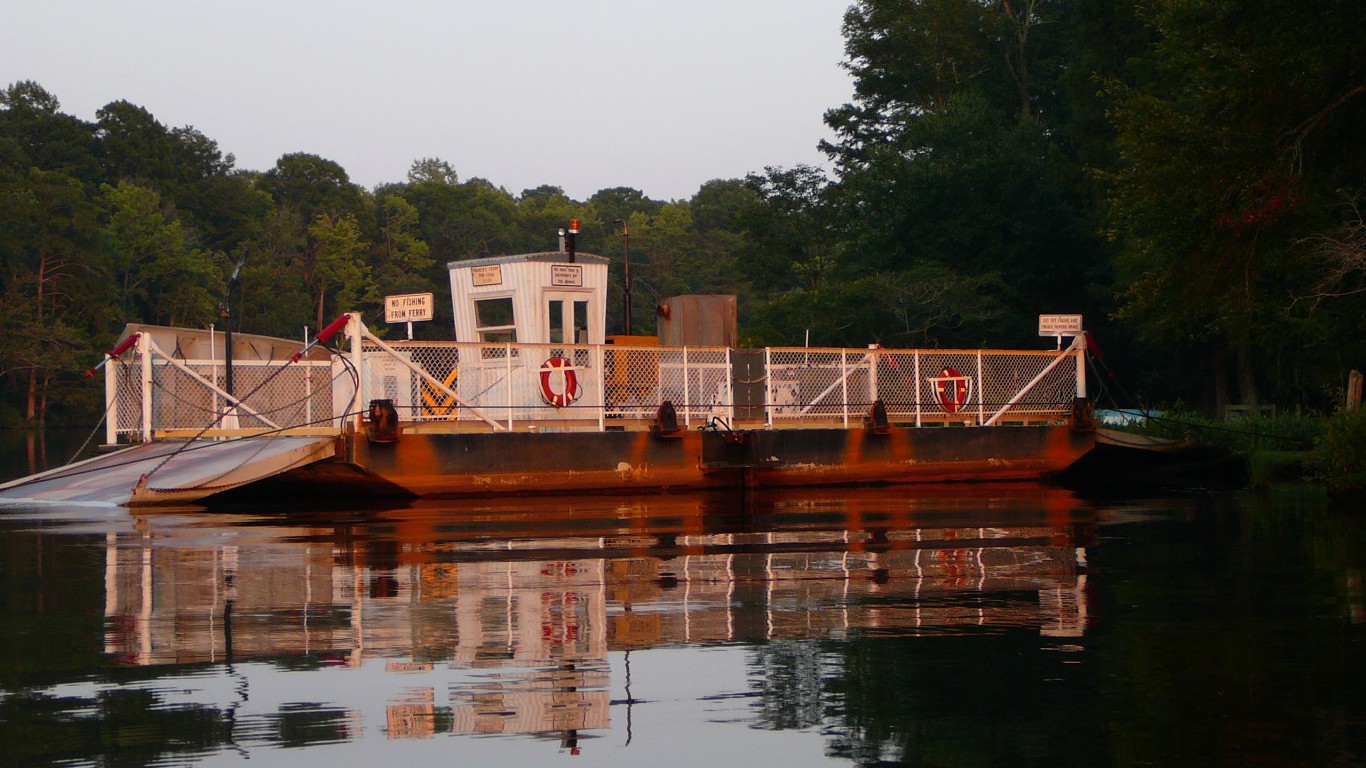
33. North Carolina
>Bluest county: Hertford County
Obama won 71.9% of the votes in Hertford County. Of North Carolina county residents, only those in Durham were more likely to vote for Obama. Unlike Durham, Hertford voters sent a Democrat to the U.S. House of Representatives in each of the last five congressional elections. The county’s median household income of $32,201 is well below the national median income of $52,482. Additionally, more than 20.0% of Hertford County residents live in poverty compared to 15.6% of Americans. Broadly speaking, less financially secure Americans are far more likely to vote Democrat than financially well-off individuals, who tend to vote Republican.

34. North Dakota
>Bluest county: Rolette County
Nearly three in every four voters in Rolette County cast a ballot for Obama in 2012, a higher share than in any other North Dakota county. While some of the bluest counties in each state routinely send Democrats to the House and Senate, other counties are more even in their representation. Rolette County is one such example. The county sent both Democrats and Republicans to the House over the last 10 years. Rep. Kevin Cramer, a Republican, now occupies the district seat. The senators from North Dakota are Democrat Heidi Heitkamp and Republican John Hoeven.
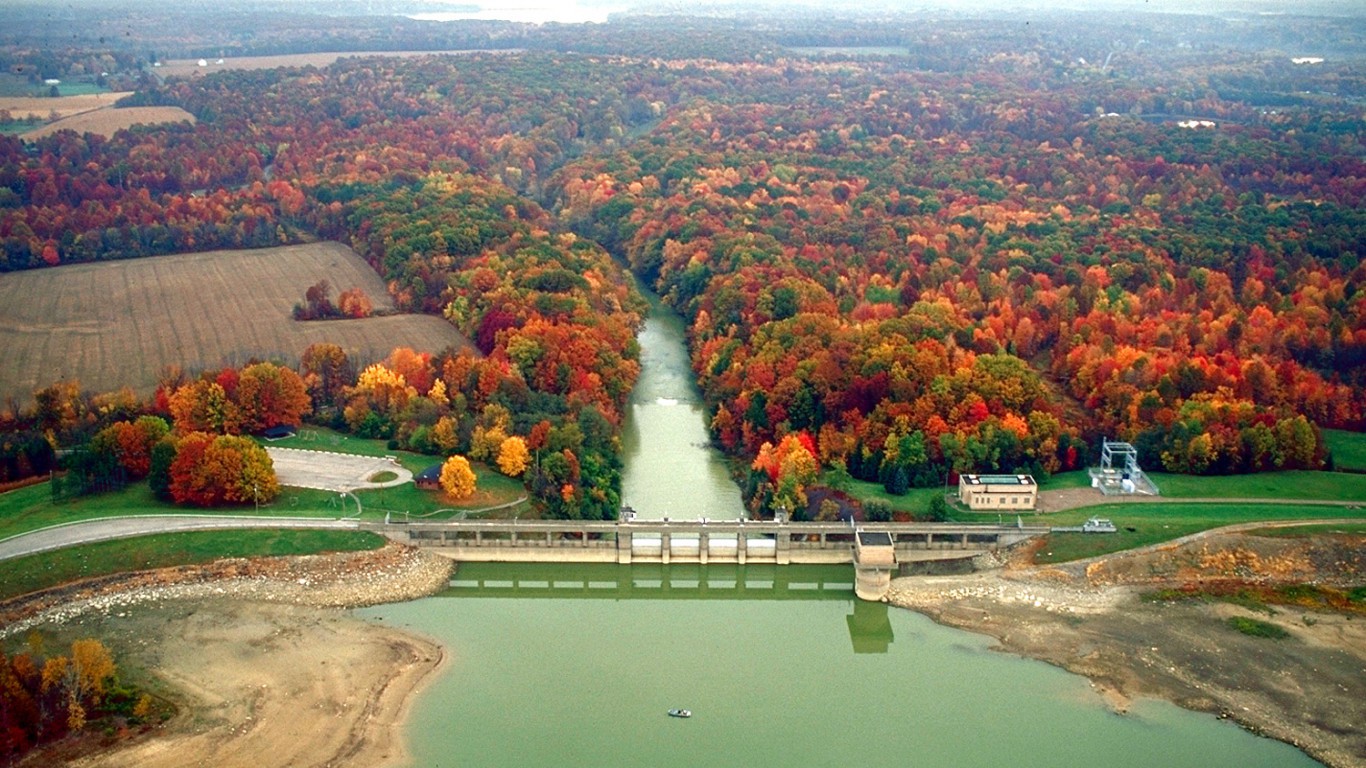
35. Ohio
>Bluest county: Mahoning County
Mahoning County is represented in Congress by Republican Rep. Bill Johnson and Tim Ryan, who like most of the county’s representatives in the last five election cycles, is a Democrat. Obama won 63.2% of the votes in Mahoning County, one of the highest of any county in Ohio. As is generally the case in predominantly Democratic areas, Mahoning county’s median household income of $41,350 is lower than the national median of $52,482.
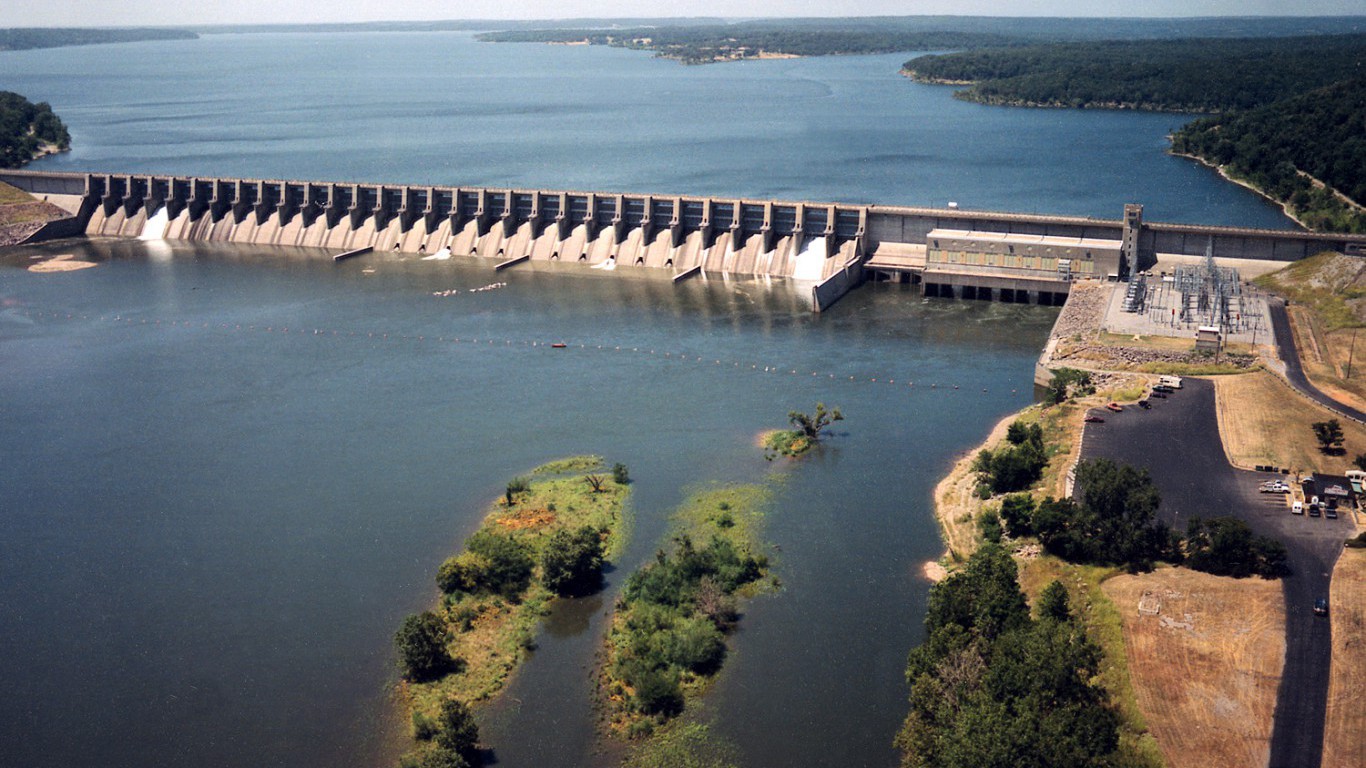
36. Oklahoma
>Bluest county: Cherokee County
Cherokee County is the bluest county in Oklahoma. While Romney received the majority of the county’s votes, 43% of the county’s 14,288 votes went to Obama, the highest share of any county in Oklahoma. By contrast, 33% of voters across the state supported Obama. As in Democratic-leaning areas in other states, less than half of Cherokee County identifies as white, far lower than the 62.8% of Americans who identify as white.
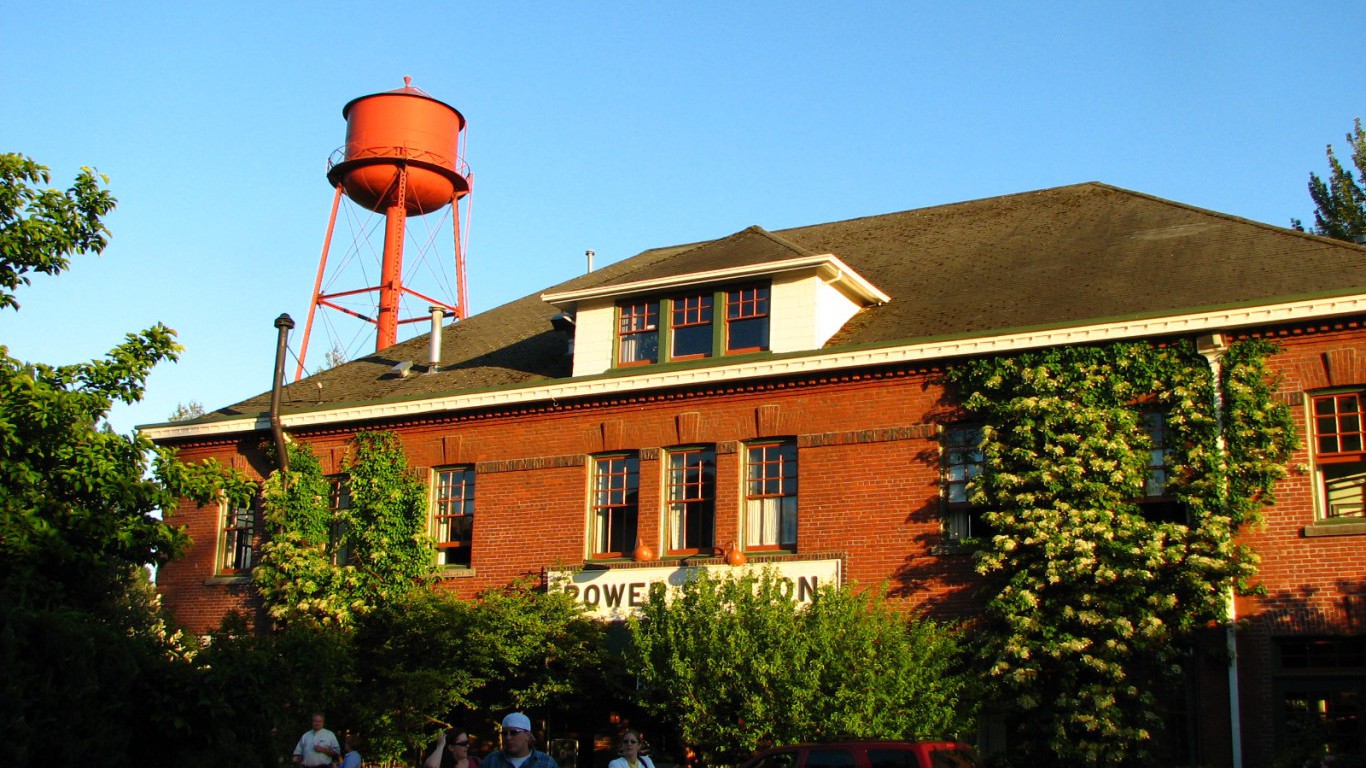
37. Oregon
>Bluest county: Multnomah County
Multnomah County, which includes the city of Portland, is the bluest county in Oregon. More than three-quarters of the county’s roughly 350,000 votes were cast for Obama in 2012. Additionally, all three of the congressional districts making up parts of the county are represented by Democrats.
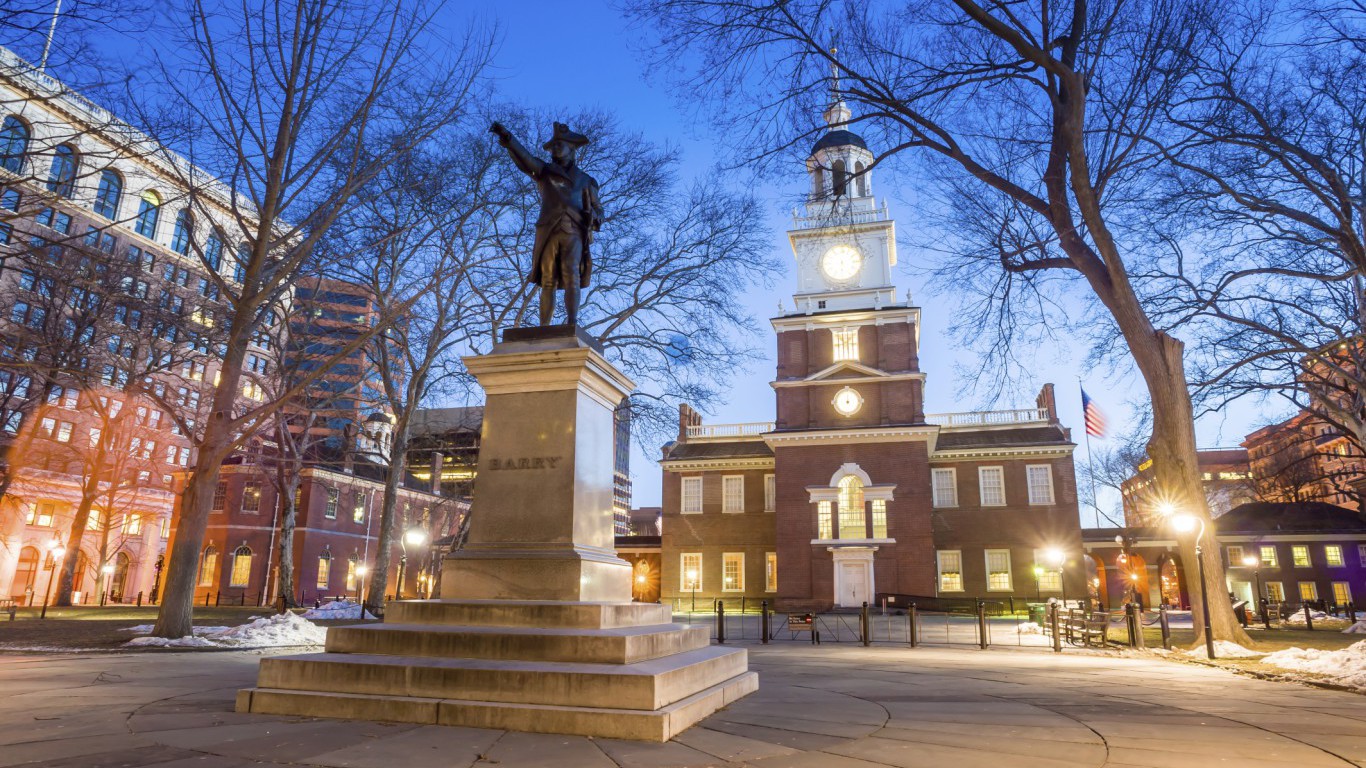
38. Pennsylvania
>Bluest county: Philadelphia County
Obama won 85.2% of the votes in Philadelphia County, the largest share of any county in Pennsylvania. In addition to voting for a Democrat for president, all three congressional districts located in the county sent a Democrat to the House in each of the last five congressional elections. Like other predominantly Democratic areas, 36.2% of county residents identify as white, and median household income is $37,460. By comparison, the 62.8% of the U.S. population identifies as white and the national median household income is $52,046.
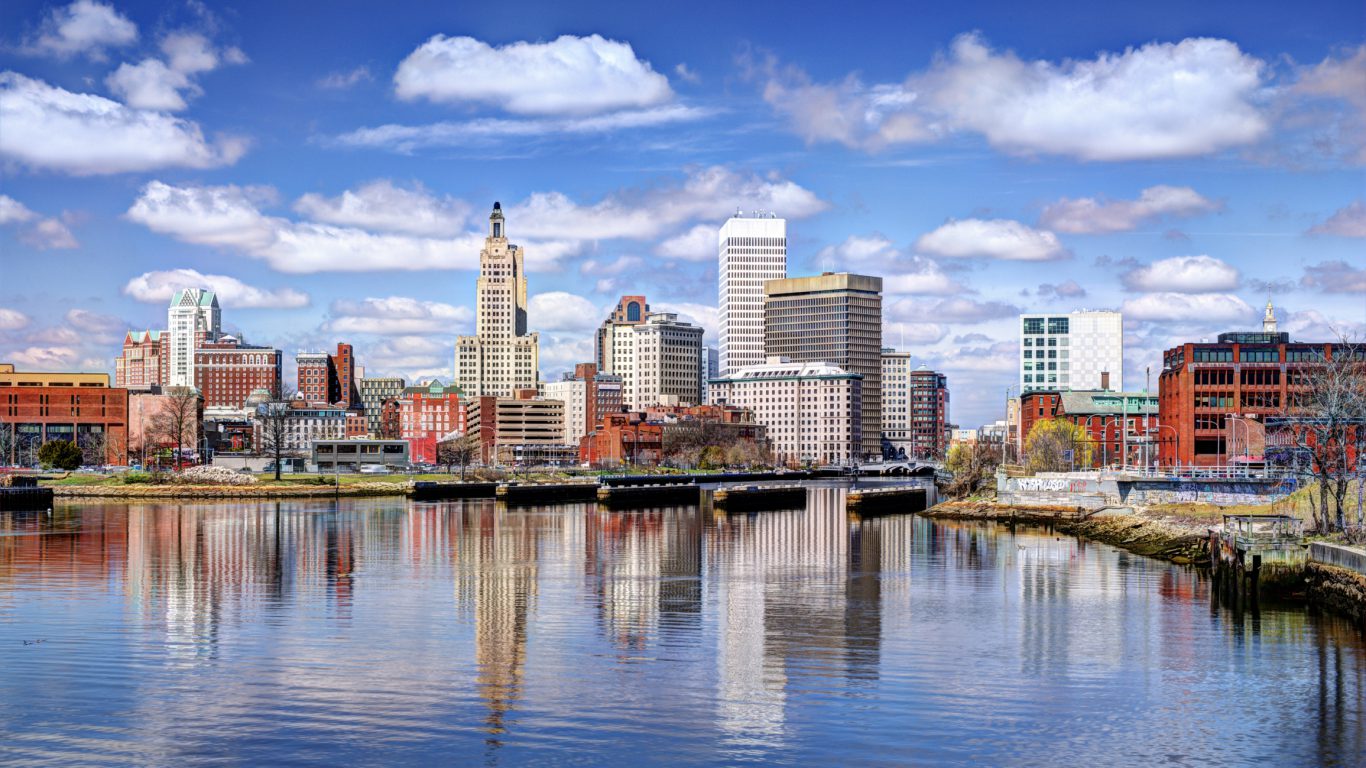
39. Rhode Island
>Bluest county: Providence County
Obama won 66.6% of the votes in Providence County. Every county in the state cast a majority vote for Obama but the share from Providence was the largest. Voters in both districts in Rhode Island, which contain Providence as well as Bristol, Kent, Newport, and Washington counties, have helped send Democrats to the Senate and House in each of the past five election cycles.
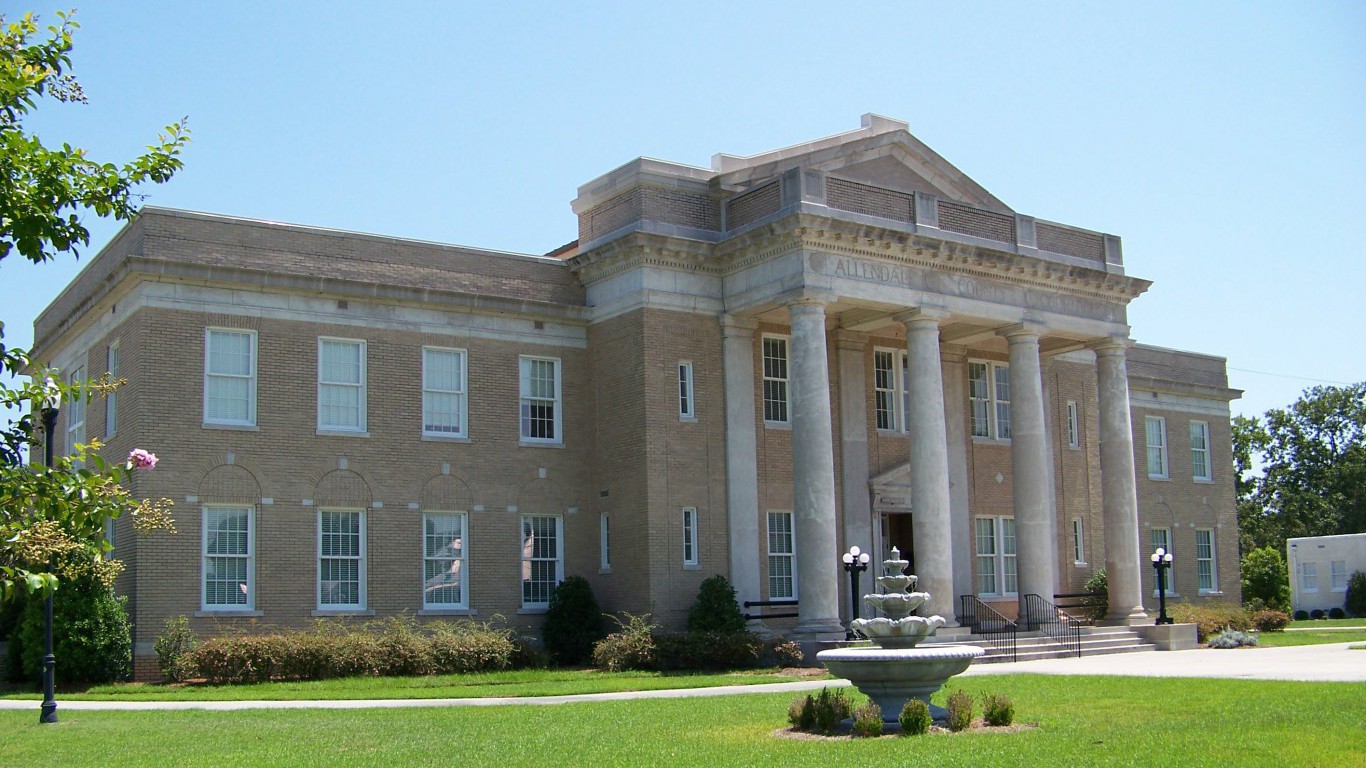
40. South Carolina
>Bluest county: Allendale County
Obama won 78.3% of the votes in Allendale County, the highest share of any county in South Carolina. In addition to sending a Democrat to the White House, the county sent a Democrat to the U.S. House of Representatives in each of the last five congressional elections. Democratic politicians are more likely than their Republican rivals to garner support from financially insecure voters, and this could partially explain the Democratic-leanings in Allendale. County residents have a median household income of $25,495, less than half the national median household income of $53,482.
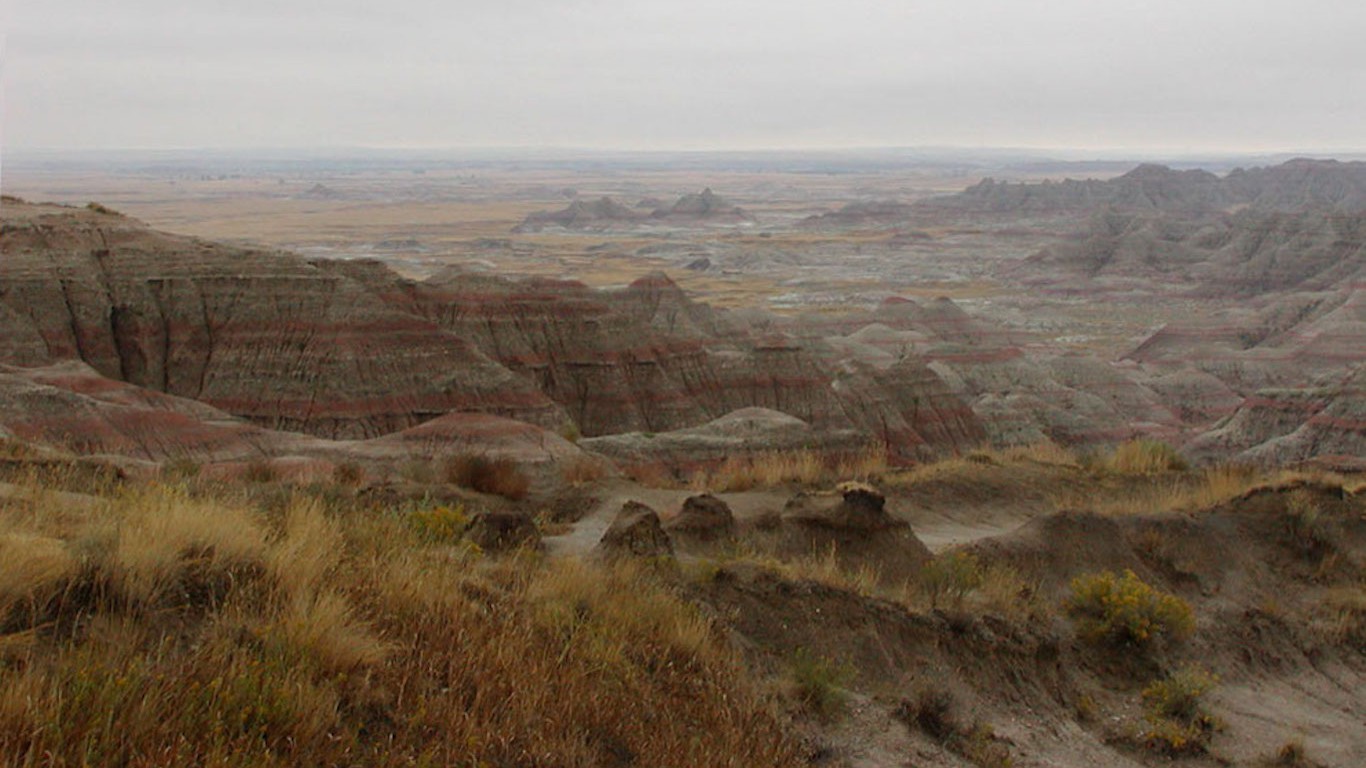
41. South Dakota
>Bluest county: Oglala Lakota County
Oglala Lakota County is the bluest county in South Dakota, with an overwhelming majority of 93.4% of voters casting a ballot for Obama in 2012. There is only one congressional district in South Dakota, and Oglala Lakota County has been represented by both Democrats and Republicans in the House over the last 10 years. Rep. Kristi Noem, a Republican, now occupies the state’s single congressional seat.
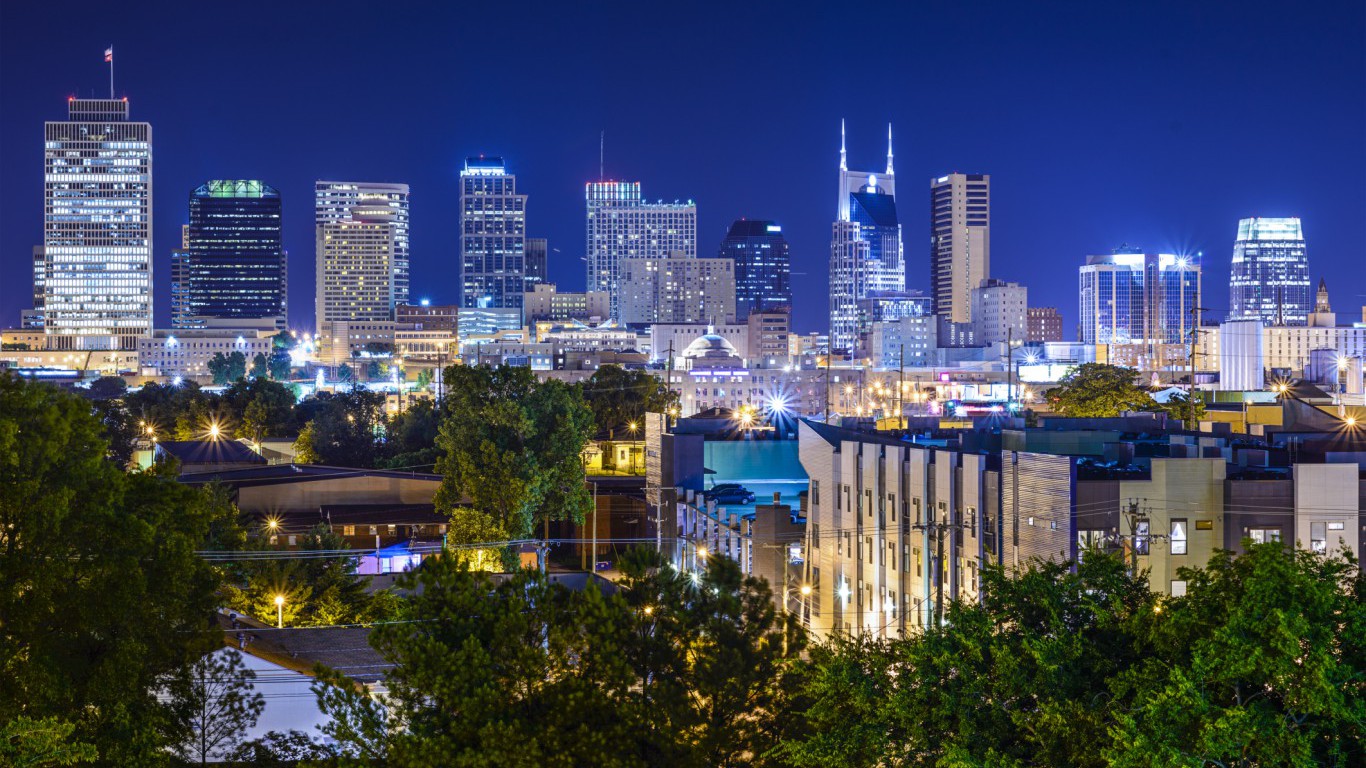
42. Tennessee
>Bluest county: Davidson County
Obama won 58.5% of the votes in Davidson County, the third highest share of any county in Tennessee. In addition to sending a Democrat to the White House, the county sent a Democrat to the U.S. House of Representatives in each of the last five congressional elections. Heavily Democratic counties tend to have lower incomes, and Davidson County fits that profile. The county’s median household income is $47,434, lower than the national median income of $52,482.
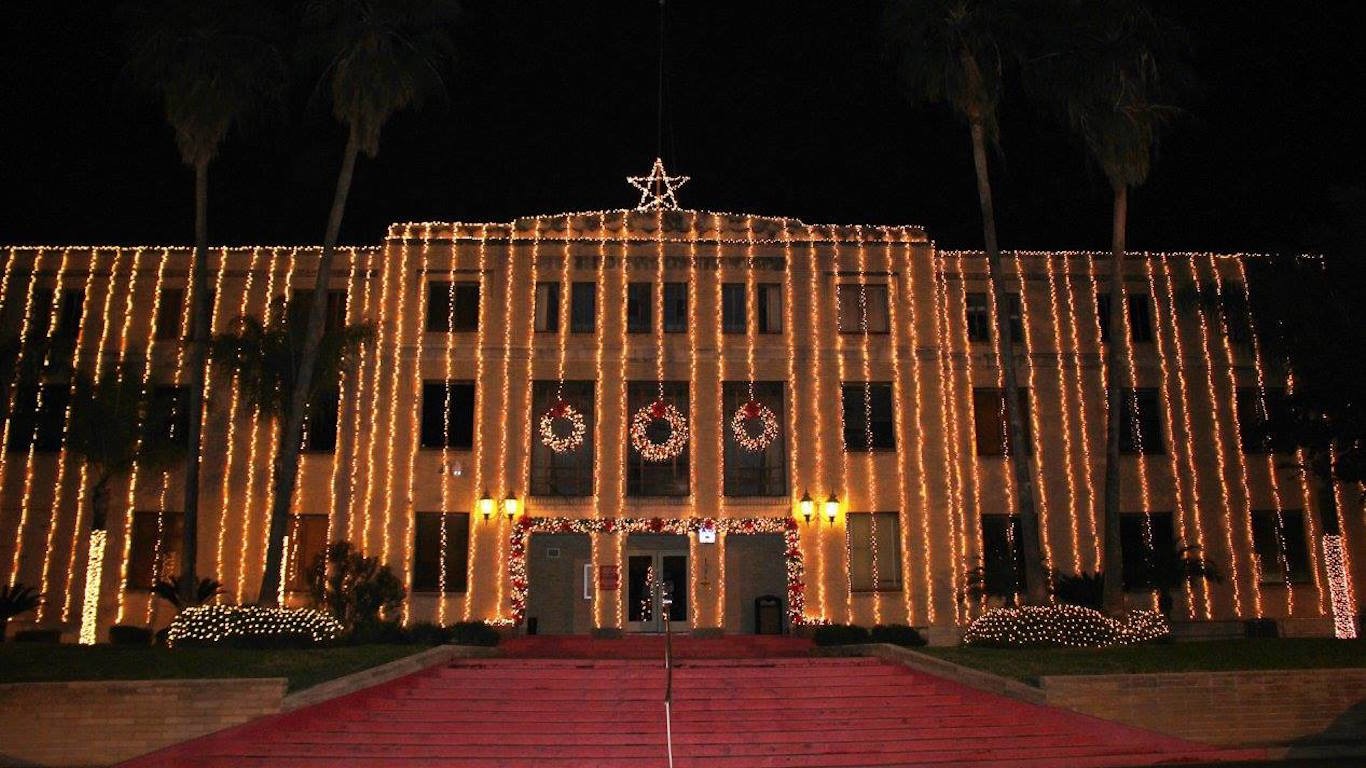
43. Texas
>Bluest county: Starr County
Texas is a relatively conservative state and is home to former President George W. Bush. Of the state’s 36 districts, 25 are held by Republicans. Starr County, however, located on the Mexican border not far from McAllen, sent a Democrat to the U.S. House of Representatives in each of the last five congressional elections. While Romney earned 56% of the Texas votes in 2012, Obama won 86.4% of the votes in Starr County, the highest share of any county in Texas.
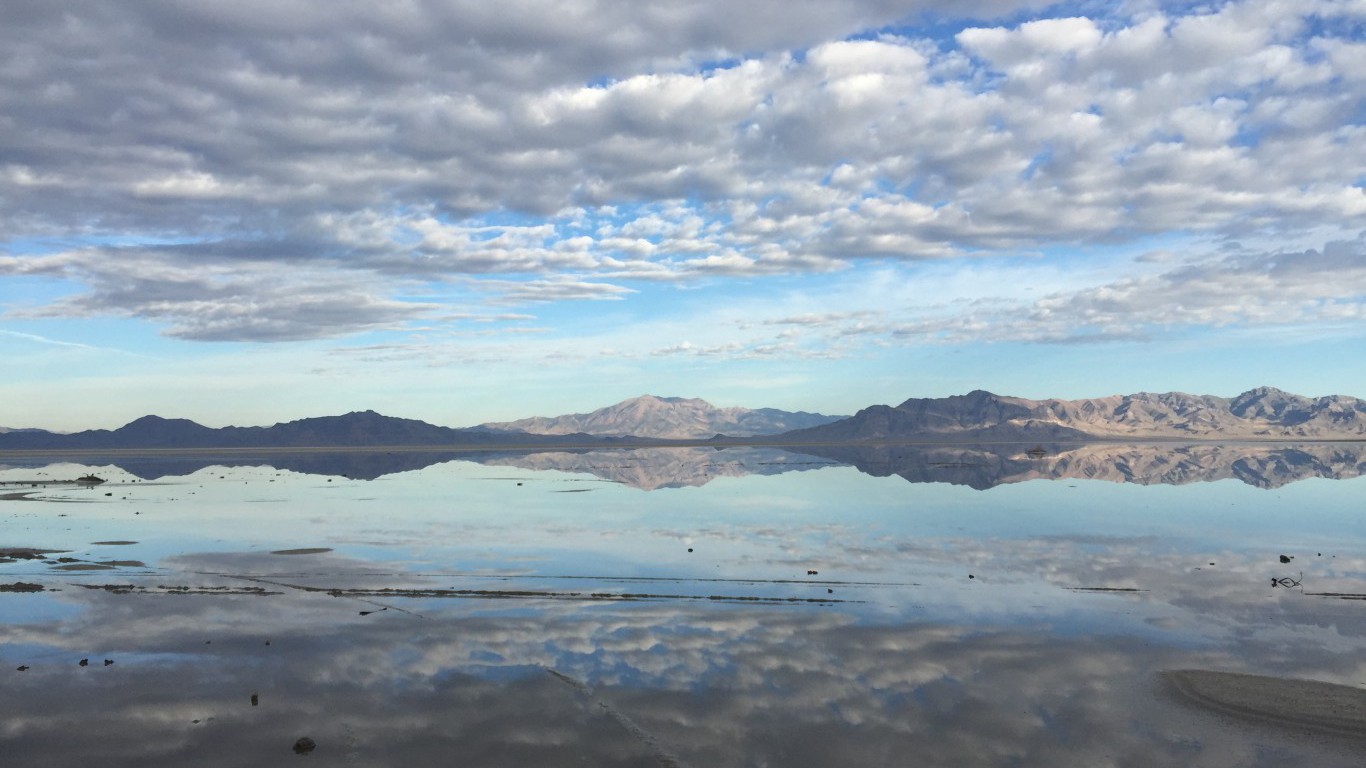
44. Utah
>Bluest county: Tooele County
Not surprisingly, presidential hopeful Romney found the most success in the 2012 presidential election in his home state of Utah, where he won 73% of the vote. In Tooele County, Romney actually received an even greater share of the votes at 74.5%. While the county voted for Romney in the 2012 presidential election, its voting record on the congressional level has not always supported Republicans. Until Rep. Chris Stewart resumed office in 2013, Tooele was represented by Rep. Jim Matheson, a Democrat, since 2001.
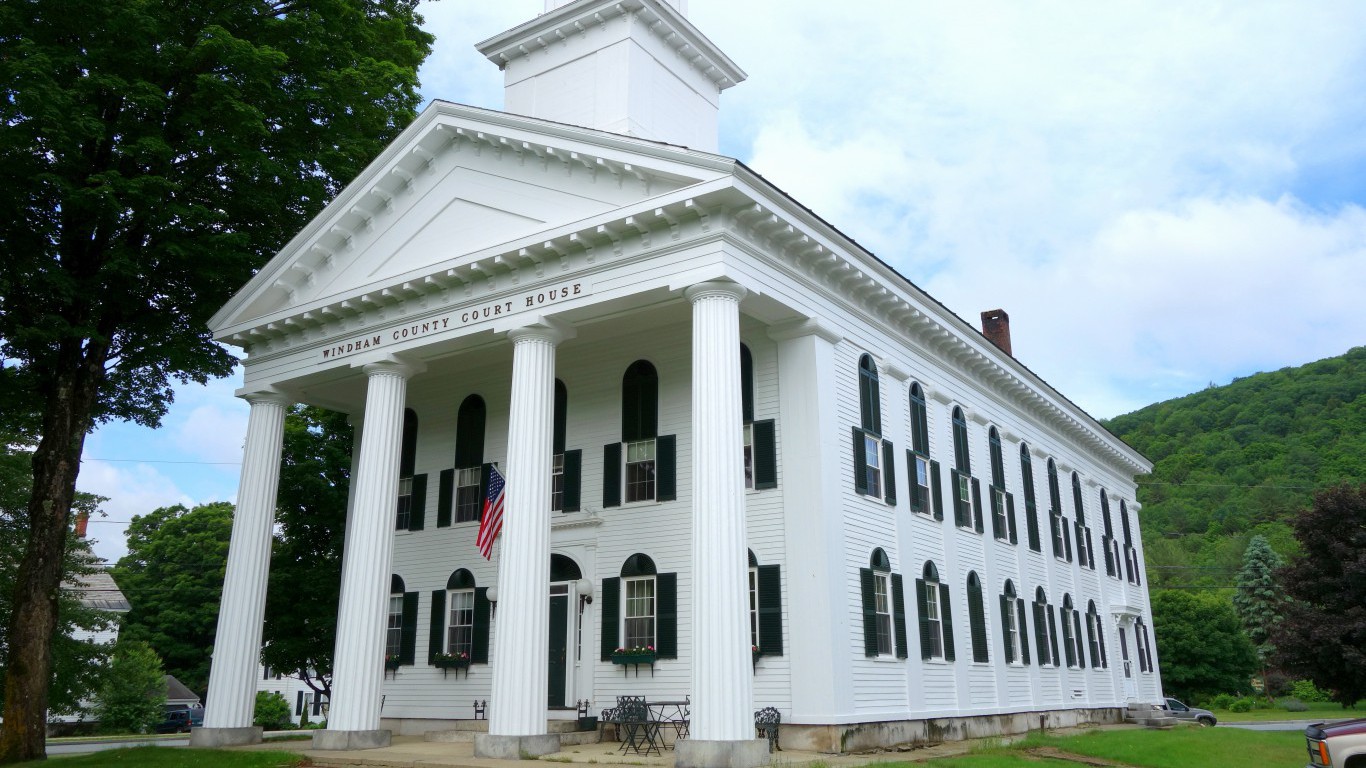
45. Vermont
>Bluest county: Windham County
Windham County, located at the southern tip of Vermont, is the bluest county in one of the most liberal states in the country. The Green Mountain State, which elected presidential hopeful Bernie Sanders to the Senate. Close to three-quarters of the county voters supported President Obama in 2012, the highest proportion of any Vermont county.
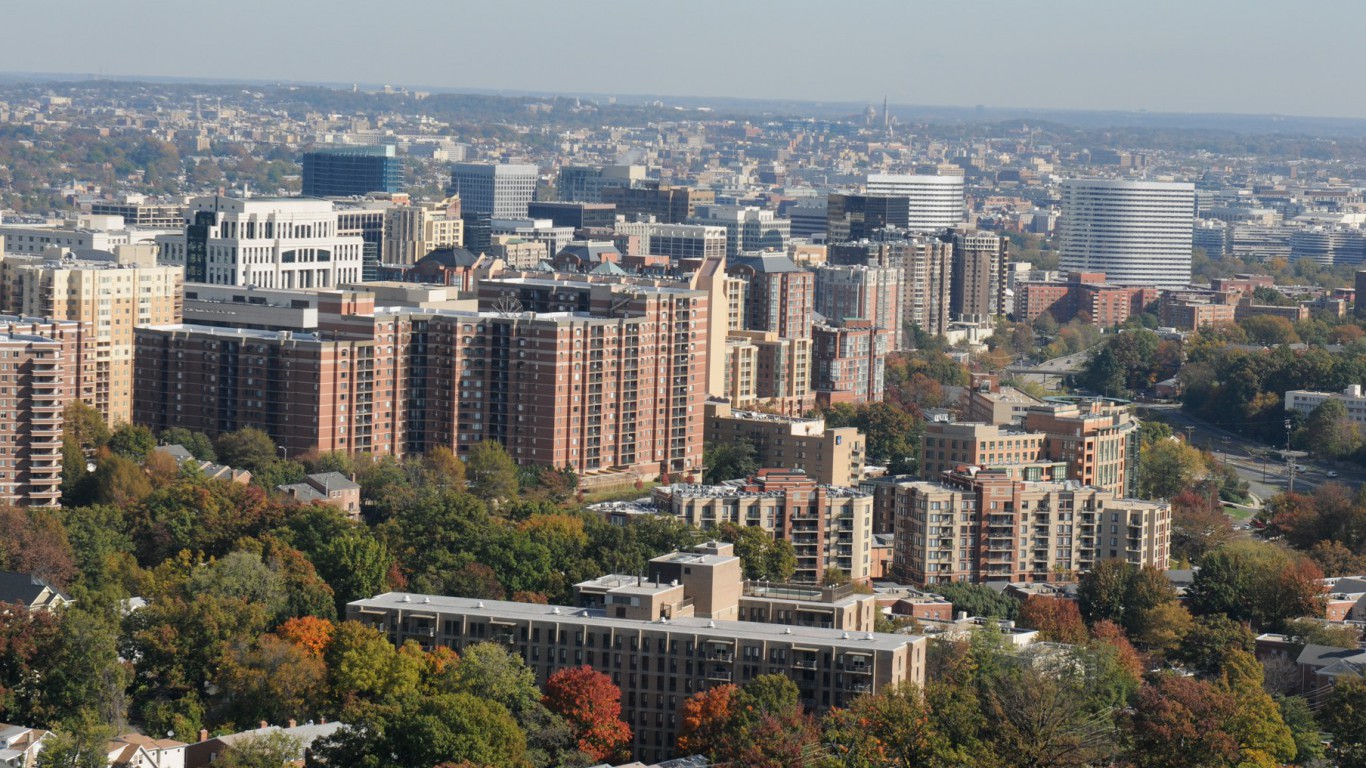
46. Virginia
>Bluest county: Arlington County
Obama won 69.2% of the votes in Arlington County, the second highest share of any county in Virginia. In addition to voting to send a Democrat to the White House, the county sent a Democrat to the U.S. House of Representatives in each of the last five congressional elections.
Arlington County is represented in the House by Democrat Don Beyer, who was elected in November. The previous 9th District representative, Democrat Jim Moran, had been in office since 1991.
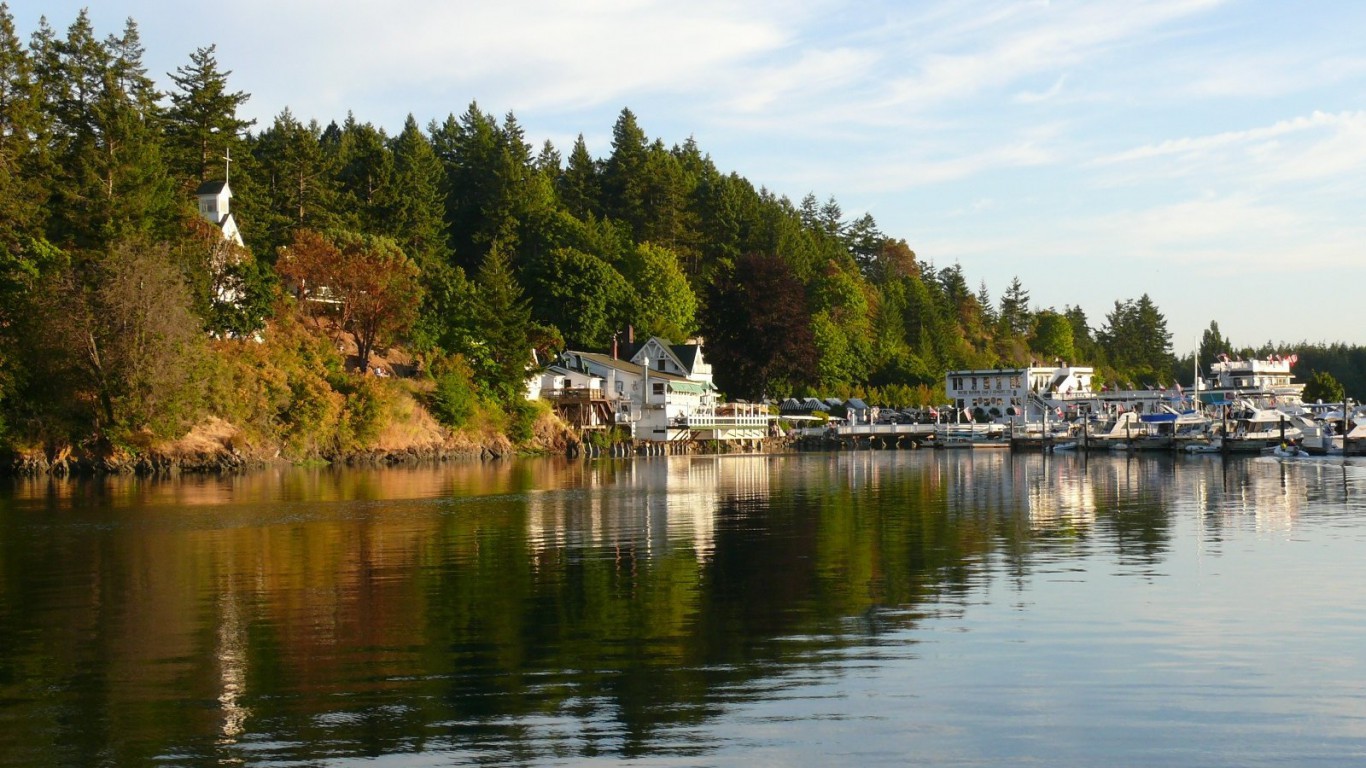
47. Washington
>Bluest county: San Juan County
Washington is one of the more liberal states in the country. The state has voted for a Democrat in every presidential election since 1988. In 2012, 56% of state votes went for Obama. In San Juan county, Obama won 67.1% of the votes, the second highest share of any county in Washington. In addition, the county voted to send a Democrat to the U.S. House of Representatives in each of the last five congressional elections.
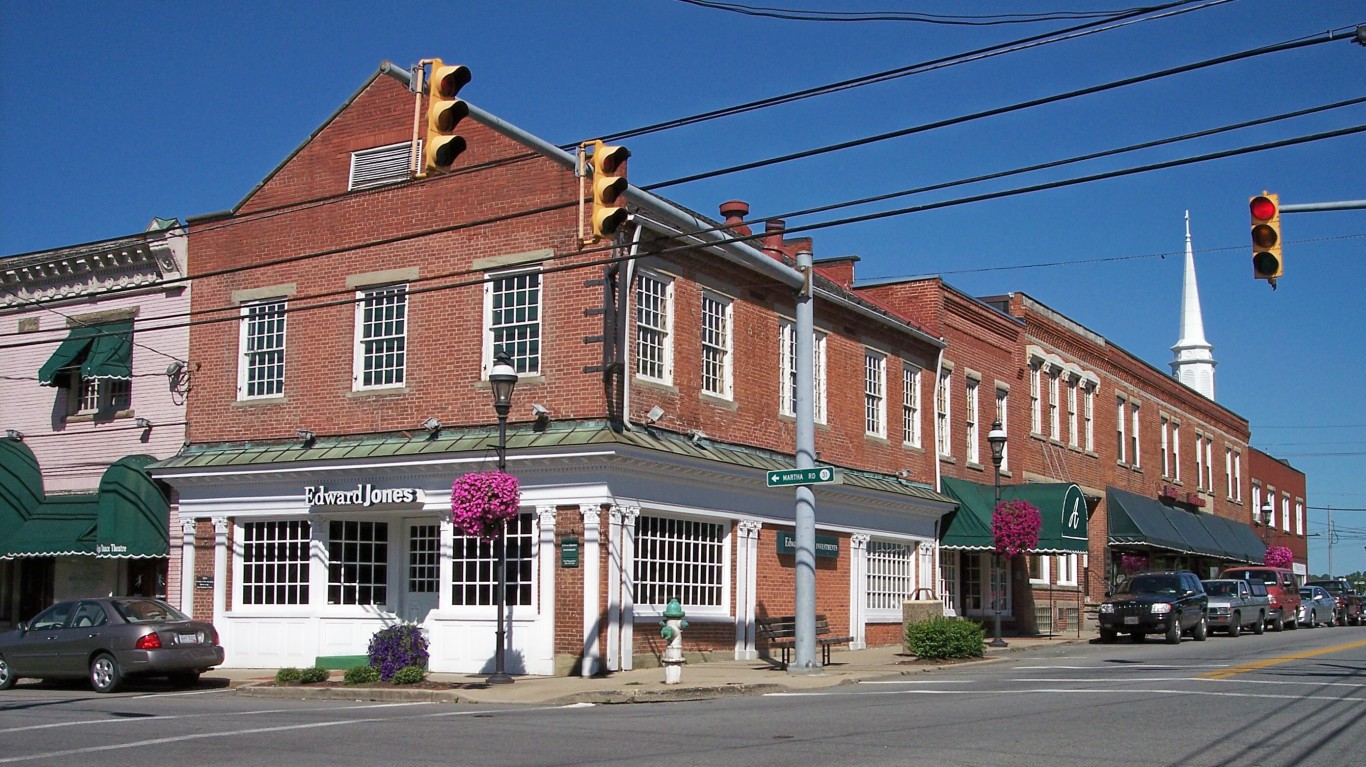
48. West Virginia
>Bluest county: Cabell County
Cabell county is the bluest county in a relatively red state. The county voted for Romney in the 2012 presidential election, with 56% of Cabell voters supporting the Republican. This, however, was a relatively small share compared to West Virginia as a whole as 62% of state voters preferred Romney, the fifth best result for the candidate of all states.
Also, the county’s voting record on the congressional level has not always supported Republicans. In four of the last five elections, county voters favored a Democrat.
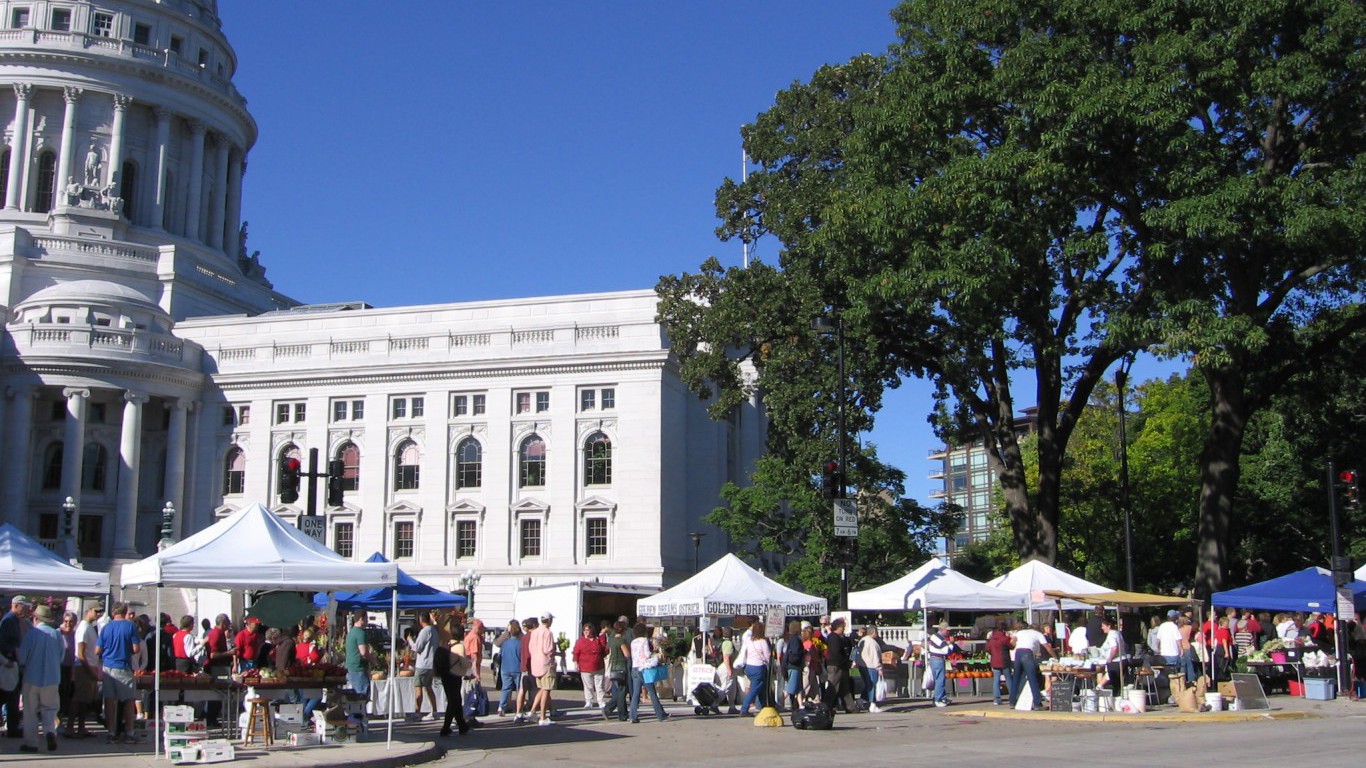
49. Wisconsin
>Bluest county: Dane County
Wisconsin is a relatively blue state, going for a Democrat in every presidential election since 1988. Obama won 71.1% of the votes in Dane County, the highest of any Wisconsin county except for Menominee. Dane County is part of the state’s 2nd District, which is represented by Democrat Mark Pocan and unlike Menominee, has been represented by a Democrat for more than a decade.
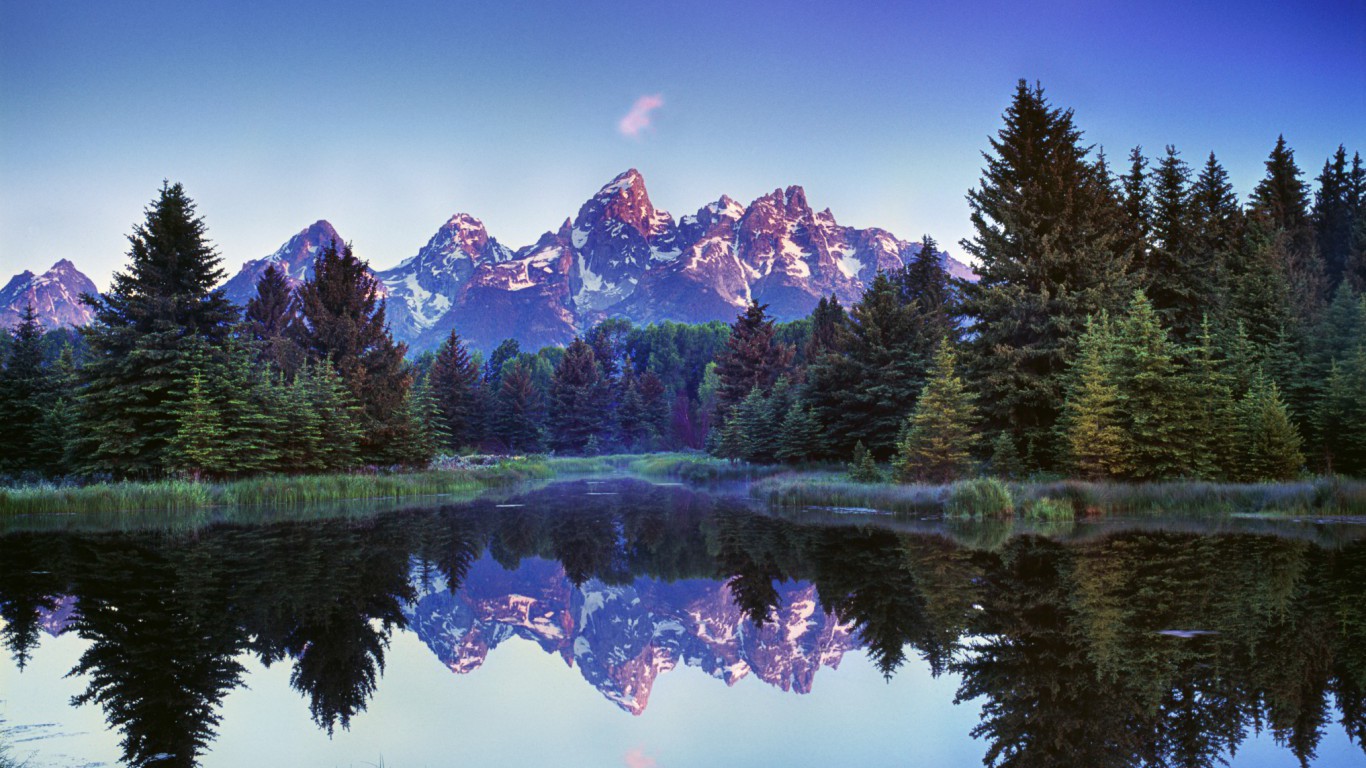
50. Wyoming
>Bluest county: Teton County
Teton County is the bluest county in Wyoming, with 54.7% of residents casting a ballot for Obama in 2012. That is a significant margin, given how red the state is as a whole. In 2012, 69% of state voters supported Romney, the second best results for the Republican candidate in the country. The county, which comprises a single district, has not elected a Democrat this century.
Methodology
To identify the most Democratic county in each state, 24/7 Wall St. created an index from various political characteristics of U.S. counties. The index is composed of three subindices: county representation in the U.S. House of Representatives in the last five congressional cycles, state representation in the U.S. Senate in the last five congressional cycles, and the share of votes cast in the 2012 presidential election. Each subindex ranges from -1 to 1, with extreme values given to counties where representation or voting shares were dominated by a single party, either Republican or Democrat. The bluest county in each state is the highest sum of our three indices. Our analysis included only counties that cast more than 2,000 total votes. The percentage of county residents who had attained at least a bachelor’s degree, median household income, poverty rates, and the share of residents identifying as white come from the U.S. Census bureau’s 2014 American Community Survey five-year estimates.
Thank you for reading! Have some feedback for us?
Contact the 24/7 Wall St. editorial team.